#and abuse is inherently non-constructive
Explore tagged Tumblr posts
Note
yeah, but you do mean 'loveless' like 'romanceless' right? Just cause you're not interested in a romantic partnership, and you're never attracted to anyone romantically, that doesn't mean you can't love your family and your friends. Am I understanding wrong? I feel like it's a widely accepted concept that 'love' isn't just romantic, it's about caring about someone, no matter if they're your family or platonic friend or your pet.
No, "loveless" means love-less. Another anon also asked me to explain as well so:
"Lovelessness" in the aro context comes from the essay I Am Not Voldemort by K.A Cook. The essay confronts normative ideas on love, its inherent positivity and what it means to not love. From the introduction, which brings up the question of non-romantic love:
This June, I saw an increasing number of positivity and support posts for the aromantic and a-spec communities discussing the amatonormativity of “everyone falls in love”. I agree: the idea that romantic love is something everyone experiences, and is therefore a marker of human worth, needs deconstruction. Unfortunately, a majority of these posts are replacing the shackles of amatonormativity with restrictive lines like “everyone loves, just not always romantically”, referencing the importance of loving friends, QPPs, family members and pets. Sometimes it moves away from people to encompass love for hobbies, experiences, occupations and ourselves. The what and how tends to vary from post to post, but the idea that we do and must love someone or something, and this love redeems us as human and renders us undeserving of hatred, is being pushed to the point where I don’t feel safe or welcome in my own aromantic community. Even in the posts meant to be challenging the more obvious amatonormativity, it is presumed that aros must, in some way, love. I’ve spent weeks watching my a-spec and aro communities throw neurodiverse and survivor aros under the bus in order to do what the aromantic community oft accuses alloromantic aces of doing: using their ability to love as a defence of their humanity. Because I love, they say, I also don’t deserve to be a target of hatred, aggression and abuse. But what if I don’t love? What if love itself has been the mechanism of the hatred and violence I have endured? Why am I, an aro, neurodiverse survivor of abuse and bullying, still acceptable collateral damage?
The author criticizes the idea of "true love" that is incapable of harm. Ze questions why we construct love in that way, and how it ignores and simplifies the experiences of victims of abuse ("It’s comforting to think that a love that wounds isn’t real love, but it denies the complexity of experience and feeling had by survivors. It denies the complexity of experience and feeling that makes it harder for us to identify abuse and escape its claws. It denies the validity of survivors who look at love and feel an honest doubt about its worth, as a word or a concept, in our own interactions and experiences.") Ze talks about being forced to say "I love you" to transphobic, abusive parents whose feelings of love was the justification for their abuse.
The core of what "loveless" as an concept is about is summed up in this quote:
There is no substantial difference between saying “I’m human because I fall in love”, “I’m human because I love my friends” and “I’m human because I love calligraphy”. All three statements make human worth contingent on certain behaviours, feelings and experiences. Expanding the definition of what kinds of love make us human does nothing but save some aros from abuse and antagonism … while telling survivor and neurodiverse aros, who are more likely to have complex relationships to love as a concept or are unable to perform it in ways recognised by others, that we’re still not worthy.
Lovelessness is against any kind of statement which quantifies humanity (and implicitly, human worth) in the ability to feel or act or experience certain things. Humans are human by virtue of being human, and nothing else. And, it is socially constructed! "Love" has no natural definition! Some people are not comfortable using "love" to describe positive feelings and relationships, and some people do not feel those positive feelings in general. And those people deserve the right to define their own experiences and their own relationship to the social construct of love.
In essence, lovelessness is both a personal as well as (in my opinion) a political identity, born from aro and mad experiences that challenges not just amatonormativity but all ideas that associate personhood and worth with the ability to feel certain things.
& as a note, there is also the term "lovequeer" which describes using the term "love" in ways which contradict mainstream understandings of what it means to love, and which kinds of love are considered worthwhile.
2K notes
·
View notes
Text
About the whole tiredsn0w situation…
I have recently been made aware of this whole situation in which tiredsn0ws essentially getting harassed. As a close friends of hers, I feel obligated to say something, however I won't reveal my identity for my own sanity.
Most of the matter I will be commenting on stems from @sneakysnekbetch ‘s blog.
CW for mentions/discussions of bullying, fetishisation, sexualisation, racism, pedophilia etc.
I didn’t scroll as far on the blog, so the screenshot order will be what is newest.
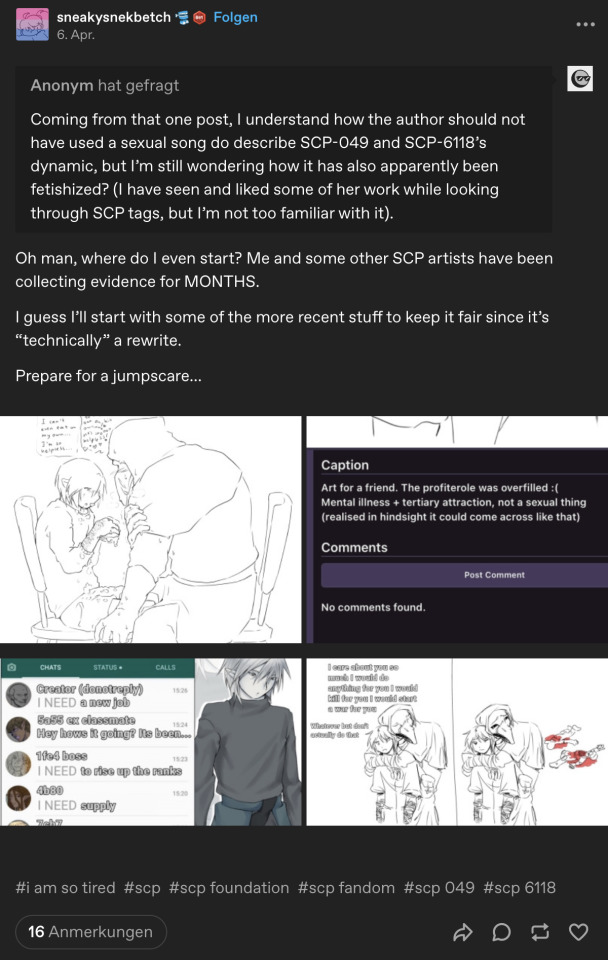
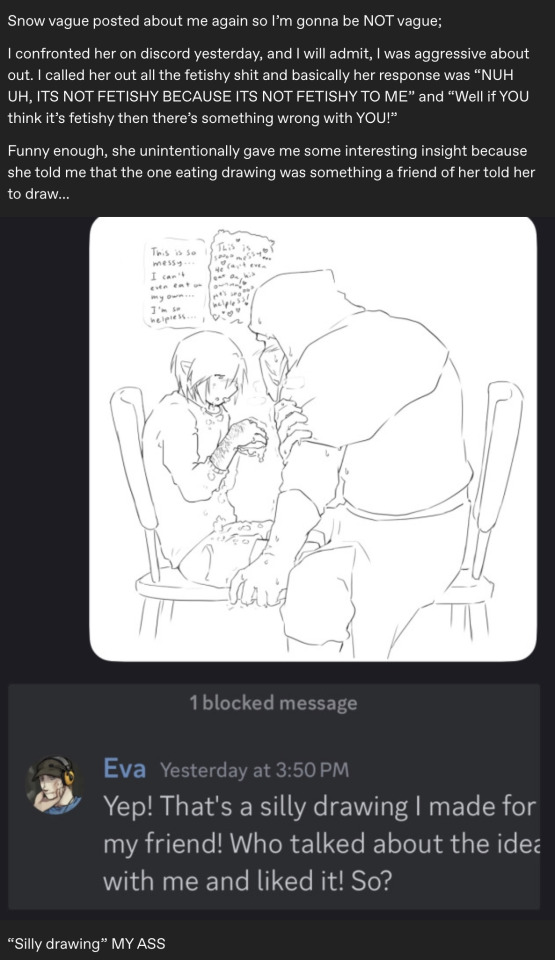
First of all, sn0w has acknowledged that the drawing may come off as sexual but is not drawn to be. I can see how it’s uncomfortable but at the end of the day, the artist didn’t intend for it to be weird. You can find it weird, but wouldn’t you say the person who made the work knows more about it than you? Rhetorical.
Second of all, to address the third and fourth image added in the first screenshot: it is so incredibly important to note that SCP-049 has BPD in this canon. He is heavily inspired by someone with BPD who Snow knows herself. The fixation/dependency/obsession that comes with having an FP is not weird just because it is platonic or familial-adjacent. Same for the last image. One of the tags was quite literally, ‘don’t tag as ship’, meaning it isn’t romantic:
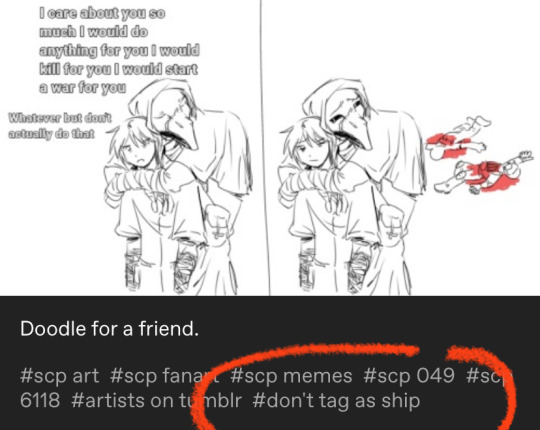
Saying you ‘need someone’ is not an inherently sexual thing.
(Referring to third image, as its been cut off)
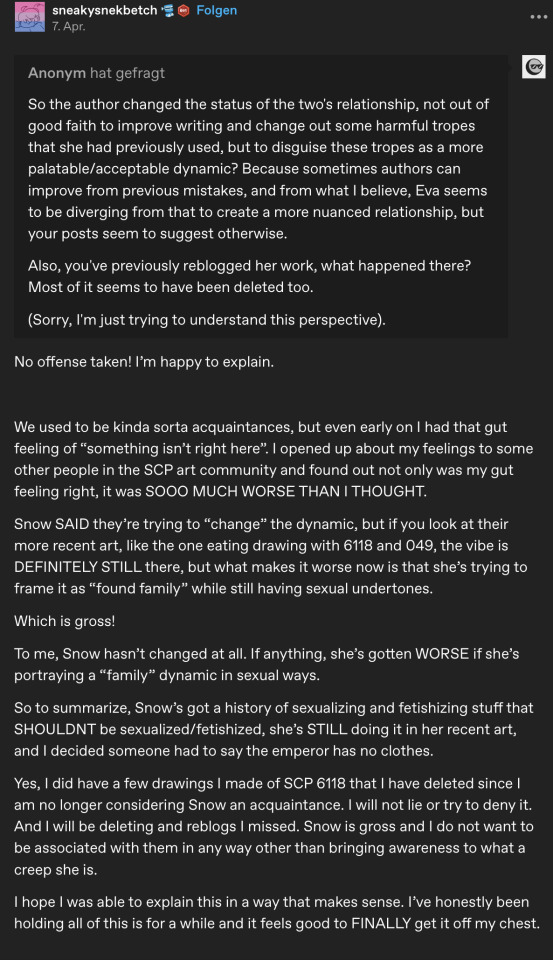
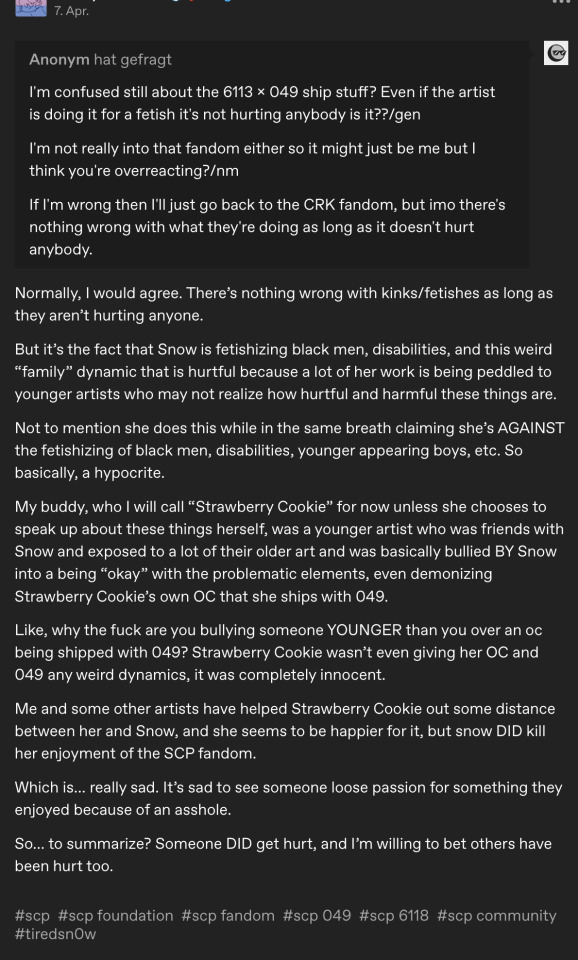
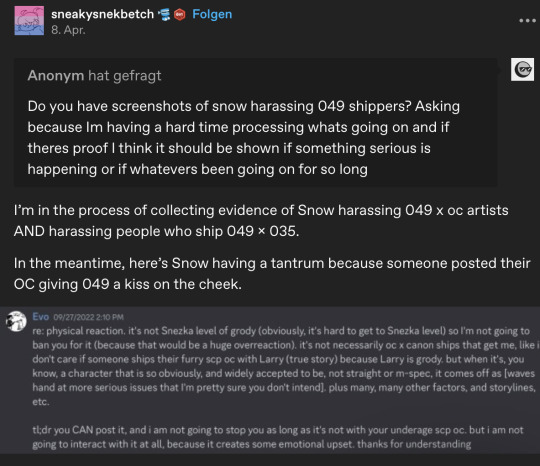
The problem with all your claims is that you leave out a shit ton of context and exaggerate what you do present.
What is depicted in the screenshot is not a tantrum, but a personal opinion that was phrased in a rather long way. Someone being non-sharing or not wanting to interact with ships is perfectly fine. I myself block SCP-049 x OC/SCP-035 shippers because it makes me uncomfortable. Likewise, this is just someone stating a boundary. Oh no! This person doesn’t like to see ships! Because of personal discomfort!
Not to mention that Sn0ws discomfort with SCP-049 x SCP-035 stems from the fact it creates personal distress with her and, in canon, is considered abusive (See: That’s not love, Isabel.)
This isn’t bullying. Unless you provide contextually relevant details, it won’t be bullying.
Obviously, even if it isn’t bullying, it is still perfectly valid to feel upset from getting comments that aren’t 100% supportive of something you create. I’ve been there myself, but to call it bullying is wrong.
Instead, that entire response just seems constructive.
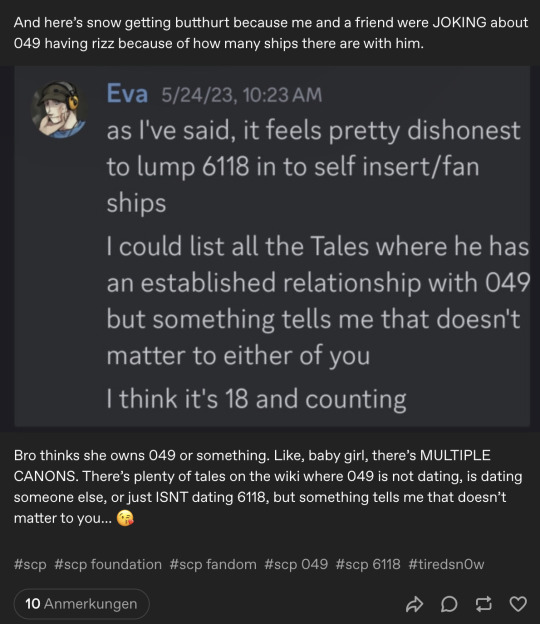
Again, this doesn’t seem butthurt, rather just clarifying? You just love to blow things out of proportion, Snek.
Also, it is SO ironic how you talk about ‘’Multiple canons’, yet you’re the person who complains about SCP-049 acting a certain way in one canon?

We also see SCP-049 being extremely paranoid and obsessive with his ideals in the article. you know what else? We also only see a bit of his character in the article. There are many ways to flesh out SCP-049s character and lore. Not everything has to be article-accurate. Especially because the entire deal with the SCP: Foundation is that there is no true canon. Go figure.
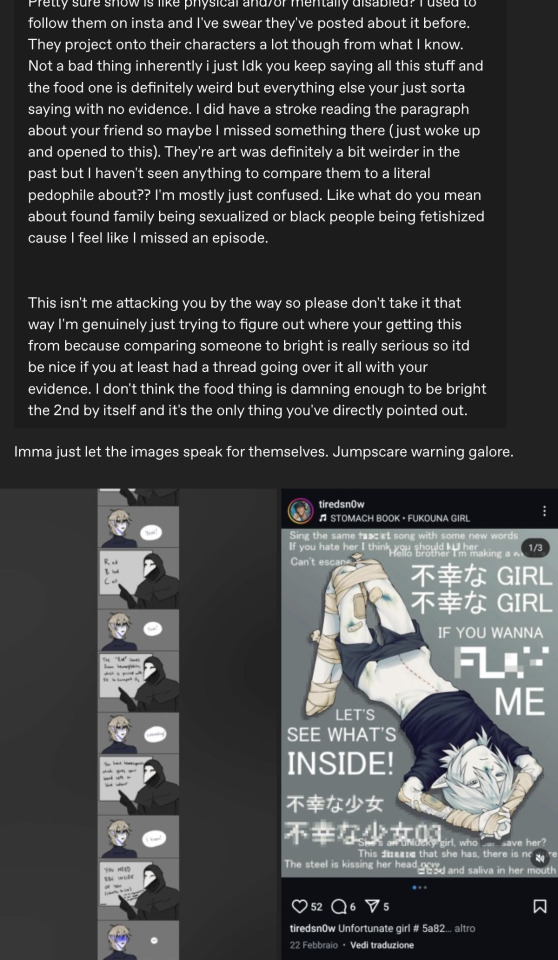
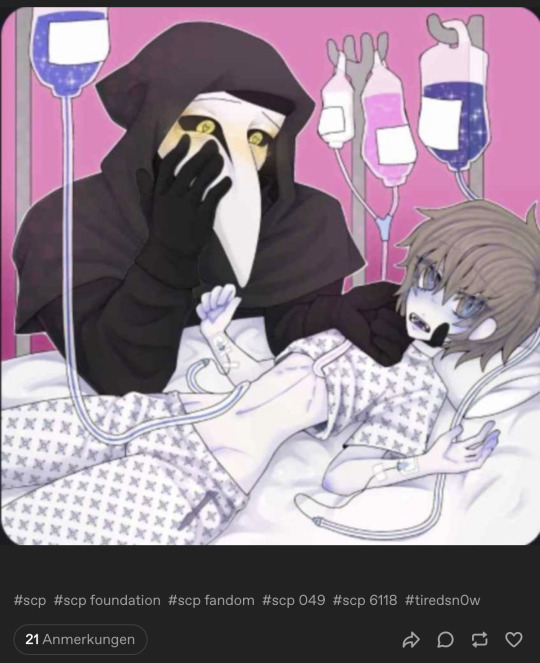
Overall, I agree with anon.
I agree that the first and latter image are odd, but those are incredibly old and also have been deleted for a good reason. The BBC one… yeah, extremely uncomfortable and weird. Again, deleted for a good fucking reason. Do I think an apology would have done better? Yeah. But still, deleted for good reason.
The second drawing, however… is just not sexual at all? Seriously, so many of your arguments boil down to, “I THINK IT IS SEXUAL EVEN THOUGH IT ISN’T!” and it is so embarrassing. So much of SCP-6118s character revolves around mental illness (that the author also has), so why are you so upset that mental illness is depicted realistically and, by proxy, uncomfortably? Get over it.
I will reiterate my point— the artist knows their own work better than yourself. But you don’t seem to understand that concept, as shown here:
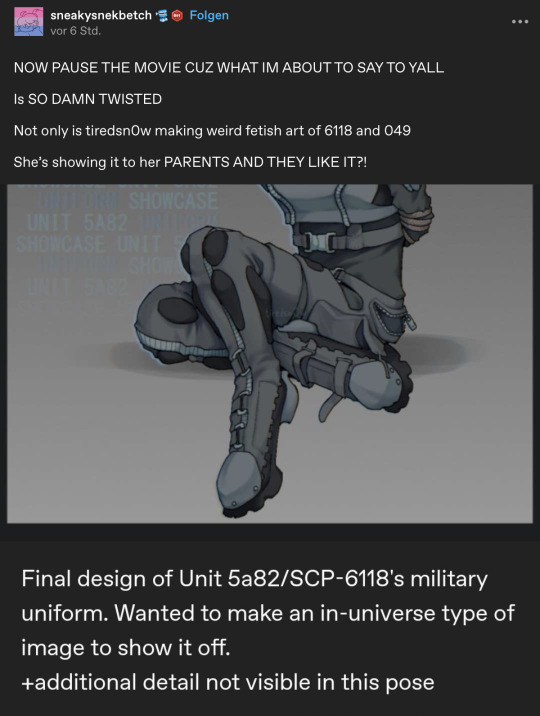
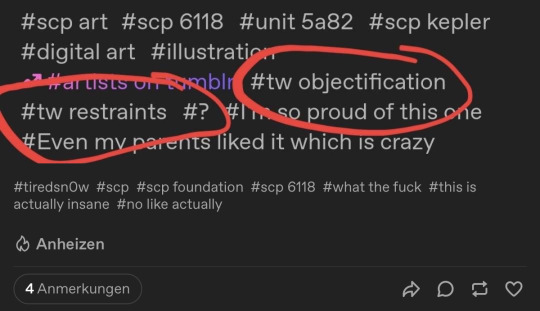
(full art for context)
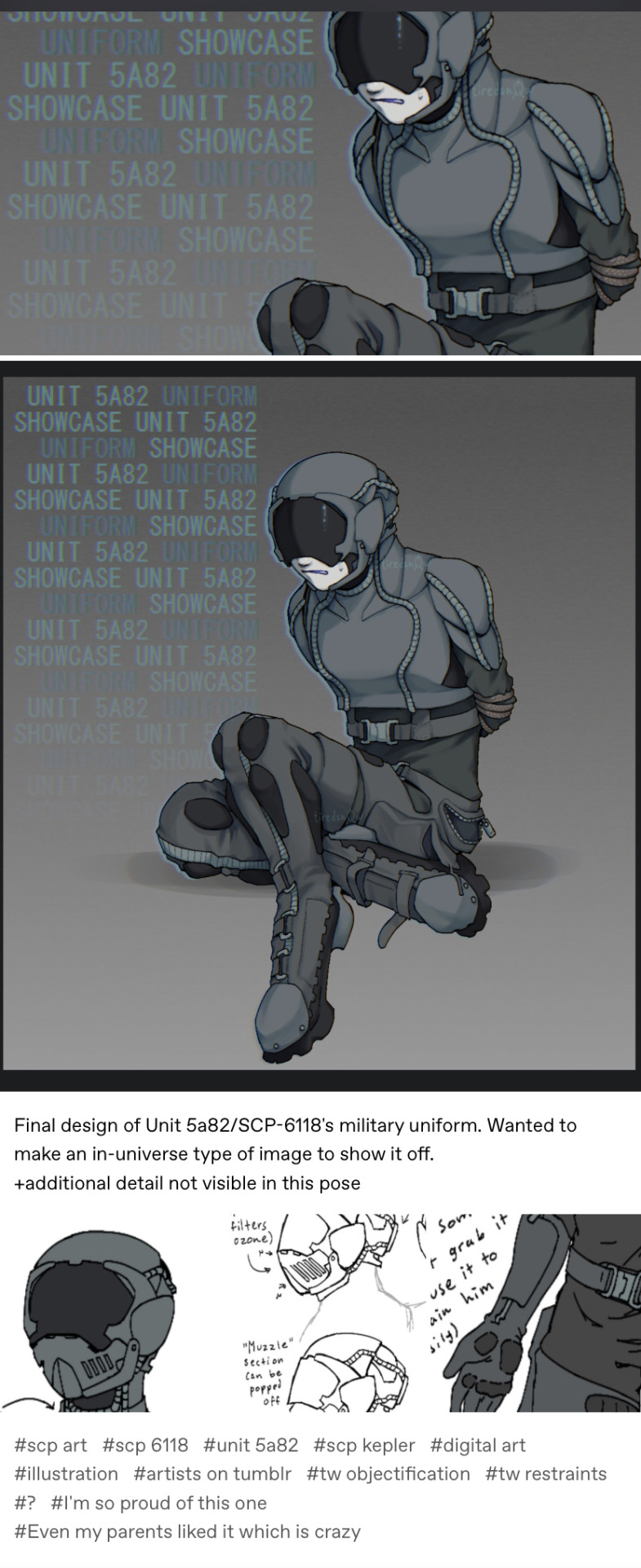
Again, that art is not sexual at all. It is someone in restraints. A soldier, no less. Restraints are so commonly used in non-sexual ways in literally so much media. You’d know if you stepped outside of spaces that portray such things as sexual.. Same with objectification. It is almost like soldiers are seen as living weapons rather than humans. You know, almost like they are being objectified.
It is almost like Sn0ws writing is literal psychological horror and focuses on the consequences of abuse, mental illness and the like.
Seriously, this one in particular is a you problem. It is no one’s fault but your own if the first thing you think of is sexual stuff. Actually embarrassing.
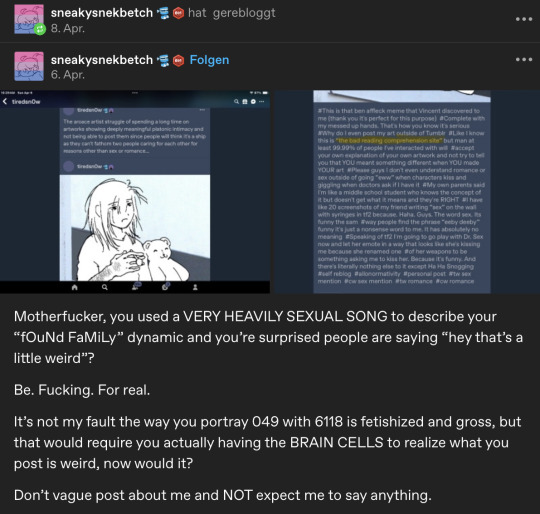
You can so absolutely find a song choice weird, but again, Sn0w said she explained her intent with the drawing SEVERAL times. Not to mention that it is so incredibly common to interpret songs that are romantic or sexual in a completely different/platonic way. Trying to explain to someone what THEY meant when THEY made THEIR work is so cringe.
For context, this is the drawing:
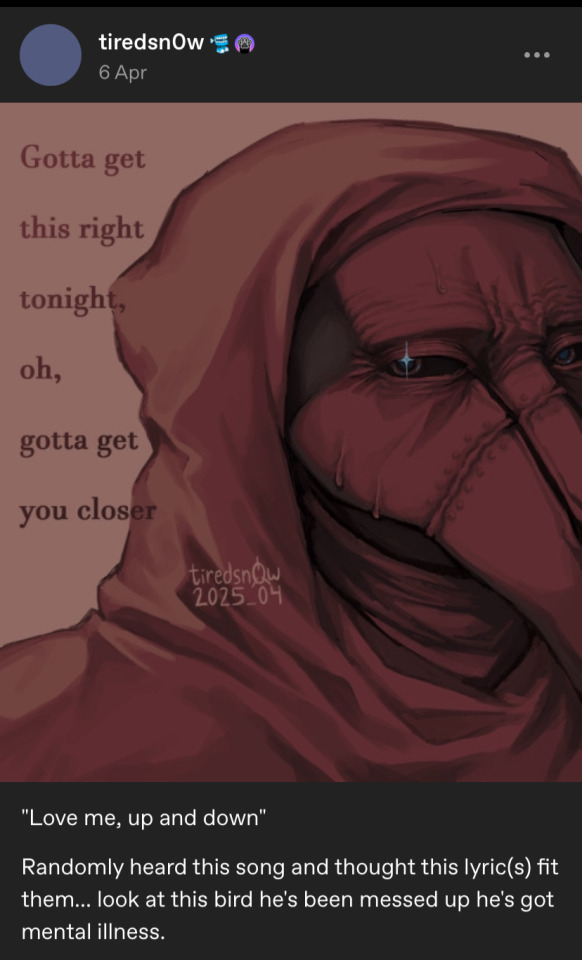
Stressing on the phrasing of ‘lyric(s)’. A lyric. Some lines. Not the entire song.
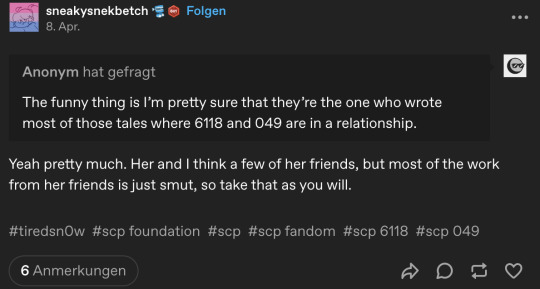
’Most of the work form her friends is just smut’, yeah, here is tiredsn0ws opinion on said work:
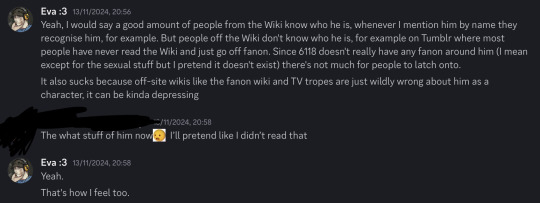
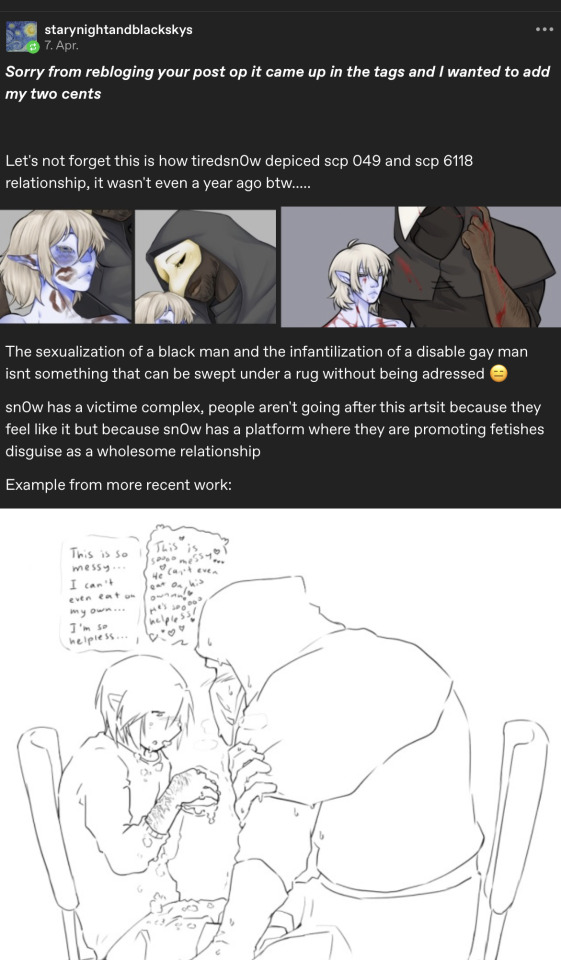
It is almost like a ton changes in a whole year and that there is a reason Sn0w distances herself from her old work and chose to rewrite it. Not to mention that sn0w has said the opposite about infantilisation of SCP-6118:
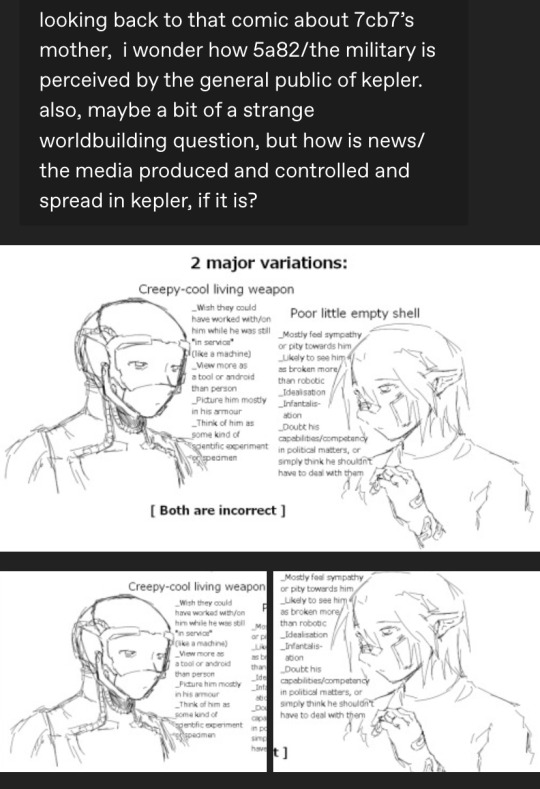
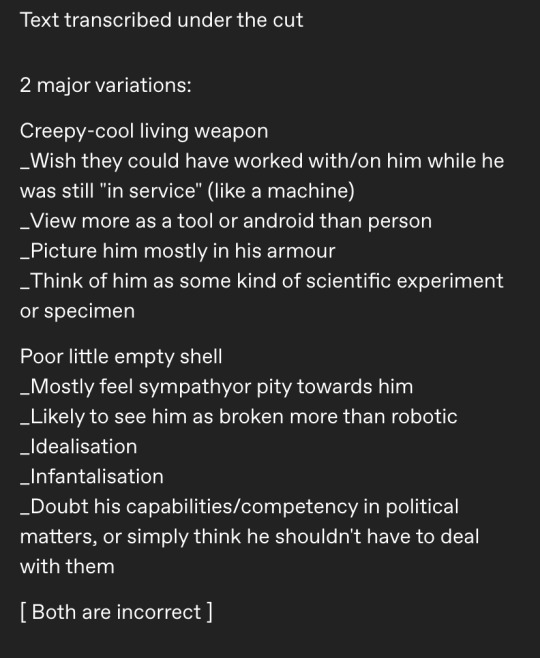
She has expressed cringe and discomfort for most of her old works.
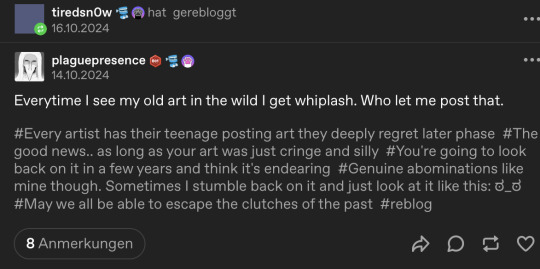
Key word: teenage. One makes and does things that are incredibly weird and uncomfortable and regrets them later on during teenhood. Sn0w has drastically changed since her old works. Here is a full overview of her thoughts regarding her old works:

Also, pointer: SCP-6118 is asexual and aromantic, not gay. Tiredsn0ws version of SCP-049 is asexual and aromantic. Tiredsn0w herself is asexual and aromantic. Aromanticism is very present in her new work. To add onto my point about SCP-6118 being SCP-049s FP (taken from rev. 10 from the scp sandbox) and their relationship being not-romantic:

Actually, none of her characters dynamics are written to be romantic:
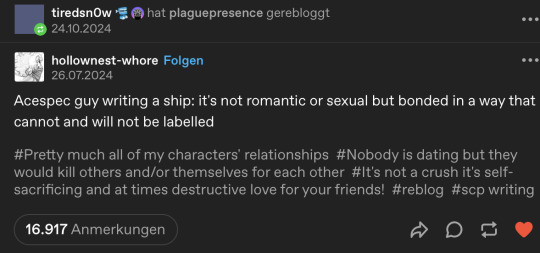
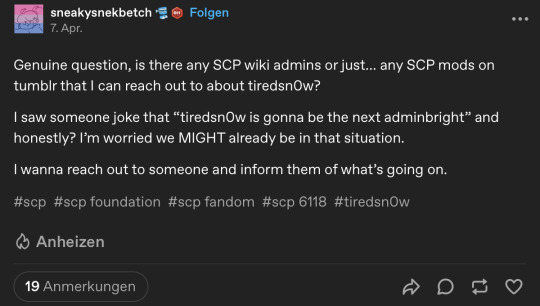
I just had to save this one for last. Do you know how absolutely fucked up it is to compare someone to a literal fucking pedophile? A groomer? Snek, you literally forced Sn0w to reveal extremely personal and traumatic details just for her to prove she isn’t, but you don’t care about that and instead keep persisting, and for what? I will not share screenshots out of respect for sn0w, but you know very well. You should be ashamed of yourself.
In conclusion, most of this boils down to people not understanding aromanticism and personality disorders in writing and making up their own interpretations of what someone meant with their work while also invading their privacy. There is a severe lack in understanding of actual story and thought process. Her work is not intended for a general audience and instead for people with mental illness and those willing to sympathize with the grimmer aspects of it.
And also, to Snek: your arguments are not constructive, they are contextually spotty and so chronically online it makes my head hurt. Your weird usage of condescending titles (i.e. babygirl, bro, etc) aren’t cool or a good ‘got-cha’, it is incredibly uncomfortable and cringe to see. Do some internal insight on why you perceive so many things as fetishistic or sexual, because at this point, it is literally just a you problem. Do better.
Also, a note about something tiredsn0w (and I, minimally) have noticed:

Micro aggressions are not okay, Snek. And neither are ignorance and performative actions.
And lastly— leave tiredsn0w alone. I block people who I think are weird also. The block button is right there, it’s free and it is available for a reason. If I can do it, so can you.
As per my personal opinion, I think that if someone has expressed distaste for their old work and wishes to disconnect themselves from it, then that is okay and should not be held over their head. The artist knows their work better than others. Even when intent is explained, it goes in on one ear and out on the other.
#Tiredsn0w#Tw fetishisation#Cw fetishisation#cw adminbright ment#Cw sexualisation#Tw sexualisation#Tw harassment#cw harassment#tw bullying ment#cw bullying ment
40 notes
·
View notes
Text
kathy acker blood and guts in high school finished 06082025 in the sleeper van on the way to brussels
a decadent, surrealist, absurd piece of fiction. erratic insertions of non-plausible characters and happenings, which reveal societal truths and philosophical revelations through humor. streams of thought interrupted, eroticization of political and power structures, introspective defiance, nonsensical yet tragic plotlines that seek to reveal underlying meanings. minimizes human desires to: eating, sleeping, fucking, loving. rejection of systemic value, experimentation with absolute loss of self, personhood, dignity; you are reduced to scum. janey, the abject of our story, is inherently manipulative and immature due to an abusive and traumatizing upbringing.
she is repeatedly cast aside and doomed to fail-- perpetually oppressed due to characteristics obtained outside her control. yet, she is still cognizant, speaking, and defying until her demise.
masternote of quotes i like that are insightful and not vulgar:Boppy doppy doopy wah yahyah mm. Is that what you think craziness is? Are you scared you're going crazy? Do people who go crazy freak you? Look sweetheart.
I live on a desert island. It’s a nice desert island. I like it here. This is what I do: I eat; I sleep; when it rains and gets cold, I hide under some rocks. I like it here. But I'm getting bored... What can I do? I can repeat what I see. I can draw this old grey trunk lying flat across a valley of sand.
You can buy anything but health. If a person isn't healthy, even if he is very famous and rich, he has nothing.
OK These are characteristics. I can either do what I want to (satisfy my characteristics) or not bother.
This is a message to myself. You are pursuing your own desires and your own desires are BORING.
Once upon a time, there was a materialistic society. One of the results of this materialism was a 'sexual revolution'. Since the materialistic society had succeeded in separating sex from every possible feeling, all you girls can now go spread your legs as much as you want 'cause it’s sooo easy to fuck it's sooo easy to be a robot it’s sooo easy not to feel.
The world I perceive, everything I perceive are indicators of my boring needs... All my emotions, no matter how passionate, are based on my needs.
Living locked up in a slave trader's room is easy. I mean, you have the same emotions over and over again, the same thoughts, the same body, and after a while, you see it's all in your mind: you're stuck to your mind. SLAVESLAVESLAVE.
ALL EXISTENCE HAS A GOLDEN SHEEN.
No matter what love what joy, what agony you know alive, soon alone you will be dead with me, and I will rub bones love with mingled bones.
...he has to perfectly read his lover's mind, silently, unobtrusively, like a corpse, and figure out at every changing second what his lover wants.
Trust is loss of thought.
One of the most destructive forces in the world is love. For the following reason:
The world is a conglomeration of objects, no, of events and the approaching of events towards objects, therefore of becoming stases, static, stagnant, of all that is unreal. You get in the world, you get your daily life—your routine doesn’t matter if you’re rich poor legal illegal—you begin to believe what doesn’t change is real, and love comes along and shows all these unchangeable forever fixtures to be flimsy paper bits. Love can tear anything to shreds.
Heavily ornamented and constructed so beyond human scale they cause fear.
Well, I couldn't help it, I just LOVE to fuck, he was SO cute, it was worth it.
You're acting hypocritically, Janey. It's because you're male-centred. Look at me. I don't smile when I don't feel like it and I don't go out of my way to help anyone.
I don't give a shit about anything
I don't have to do anything
everything lives
Your conception of who you are has always, at least partially, depended on how the people around you behaved towards you. You sensed the people around you aren't right: what you did, your need, you weren't defying them to defy them, it was your need, was OK. You don't know. How can you know anything?
The roads are getting so super-paved and big and light and loaded with BIG MACS and HOWARD JOHNSON that the only time people are forced into danger or reality is when they die.
18 notes
·
View notes
Text
svsss and sexual violence pt. 2: gender and homophobia
standard disclaimer at the beginning: i am not saying that this is the Only thing svsss is about, or that other readings are invalid; i am not intending to character-bash most of the characters here (while i will freely admit to thinking e.g. old palace master or qiu jianluo are pretty one-dimensionally shitty, lots--probably most--of the characters in this series who i mention as perpetrating SA are characters who do have depths & who i in fact like a lot! despite this meta, or perhaps because of it, my second-favorite character is luo binghe, and i am in fact a bingqiu shipper!); and, obviously, huge fucking CW for sexual abuse and adjacent topics. this one's also got a CW for, well, homophobia and sexism. this section is approximately 1k.
(also: shoutout to @rooses40stepskincareroutine for motivating me to actually write all this out!)
TABLE OF CONTENTS pt 1: shen yuan's realization of himself as a target pt 2: gender and homophobia (you are here) pt 3: non-bingqiu sexual violence pt 4: shen qingqiu's body pt 5: we live in a society
We talked in the previous post about how Shen Yuan begins the story oblivious to himself as a potential target for sexual violence, and that his realization that he is in danger of this is the same as his realization that he is a target of male sexual desire. One of the quotes I think about a lot here is a much later quote:
Yeah right! Like he’d dare share a room with Luo Binghe. A straight man and a gay one staying in the same room? That was just asking for death. Yes, Shen Qingqiu insisted he was still straight! His willingness to read a stallion novel like Proud Immortal Demon Way was rock-solid proof!
And--on the one hand, this is funny. I'm not going to say this isn't funny, because it is; we as the reader know that Shen Qingqiu is obviously not straight and that reading stallion novels does not actually make you straight. In light of this, his insistence that he is straight is funny!
But. There's also two other things going on here:
We all know the trope of the predatory gay man, right? Gay men (and queer people in general, though the specifics of this vary by sexuality/gender) are seen as inherently sexually predatory; you see this in the idea of gay men "converting" straight men and boys through rape/molestation, you see this in AIDS-era fears of HIV+ men who deliberately tried to spread HIV (often through rape) as much as possible, you see this in modern-day grooming panics. one of the most common ways homophobia manifests is this sort of idea--as a teenager, one of my friend's parents stopped letting me have sleepovers once they learned I was a lesbian, because they didn't want me sleeping in the same room as their daughter; you see stories of people kicking gay people out of changing rooms, of refusing to touch them/let them touch others, and generally isolating them from platonic intimacy with the same gender due to the specter of gay people being sexually predatory. Shen Qingqiu's narration very deliberately calls this to mind: A straight man and a gay one staying in the same room? That was just asking for death. there's interesting things to say here about how mxtx interacts with this trope in her other two novels--lwj and hc are both definitely also engaging with this trope, though very differently--but i'll keep this post focused on scum villain.
however. as established in part one: luo binghe has in fact sexually assaulted and been sexually predatory towards shen qingqiu. between the kiss in the dream and here, we get two major moments: the first, where luo binghe admits he knew it was the real shen qingqiu and not a dream construct when he sexually assaulted SQQ in the dream, and the second, where luo binghe holds shen qingqiu down, tears off his clothes, and explicitly threatens to rape him. which...yes, luo binghe clarifies shortly after (when sqq starts dying) that he wasn't actually going to rape sqq, he just wanted to scare him. but, uh, holding someone down and then--while they try to fight--kissing them, tearing off their clothes, and telling them that you're going to rape them? that is still very much SA. so sqq's fears of LBH are ... well, they're justified, and they're coming from a place of trauma.
I... have some genuinely fairly mixed feelings about how MXTX handles this combination in SVSSS? right now i'm not actually doing very critical analysis of the text tbh, so i won't go into it, but i invite you to think about it for yourself about it!
that said, i have more things to say on other topics. specifically: SY thinks of himself as a straight man, and thus safe. but he's been put in a very feminized position by the narrative. he's constantly on the other end of LBH's wife plots, to the point where, in the extras, the culmination of their marriage involves LBH calling him "wife". the genre change is vital to understanding this--he's no longer a man in the real world, or even a man in a stallion novel; he's a shou in a danmei. (and while there's a lot of discourse on the feminization of bottoms in M/M, esp written by women, i want to emphasize that this isn't exclusive to chinese-language M/M--go read some omegaverse on ao3 to see some men being feminized by the narrative in much more extreme ways, without any of the interesting commentary on genre!) now, this is a role that is also very distinct from being a woman--especially on the doylist level, the [shou/uke/bottom] in M/M is generally written better and is more central to the narrative with fewer sexist tropes than the actual women in the story, and svsss is no exception to this--but it's still very distinctly feminized. something I think about in this regard is how his internet handle, "Peerless Cucumber", is misheard in SVSSS as "Peerless Chrysanthemum"--his name has been changed, by the setting, from something representing [penis/topping] to [anus/bottoming]. It's a representation of traditionally male bottoming, it represents the anus and not the vagina, but it's still a very literal emasculation of Shen Yuan by the setting of SVSSS! another sample quote:
In conclusion: So the female lead’s role was going to Shen Qingqiu again, huh?
this is also particularly interesting to me because of the ways SQQ is sexist, just like the previous quote is interesting because of how SQQ is homophobic. another quote, from earlier in the book:
He was a man, yet he had been forced to meekly tell another man that he would “submit to him,” in front of so many people. And above all, the other man was his former disciple, which made it even more frustrating and shameful.
again, we see his sexism and anxieties around masculinity being tied up in his anxieties around sexual abuse. he sees putting himself in a position where he's at risk for sexual abuse (because he is doing that, he has just learned that LBH knew he was real when sexually assaulting him in the dream, and he is now agreeing to submit & go home with him) as shameful. why? because he's a man. the implications that it's shameful for men to be sexually submissive or get sexually abused (which are conflated here and throughout the novel by SY, although other characters draw a distinction! but SY's views on ~kink, both D/s and S&M, while fascinating and very relevant to the bingqiu relationship and his relationship w queerness, would be thoroughly a tangent here--ask me if you want another post on the subject lol), because men should be "stronger" than that, but it would not be shameful for a woman, because women are supposed to submit to (and be sexually abused by) men, is left as an exercise for the reader. so ... he's being wildly sexist! but even here you can see he's being sexist because he's being emasculated. because he's being pushed into the "female" role, instead of the "male" one, and when it comes to sexual violence & the fear thereof, that's a dangerous place to be. once again, being a man doesn't protect him: a lesson he will keep learning.
there's more to say about gender & sexual violence in SVSSS about other characters, but that mostly gets addressed in the next post, except for my thoughts on gender that aren't about sexual abuse (i have a LOT of these--mostly about bing-ge vs bing-mei, but also about shen yuan's view of femininity as inherently degrading and painful, which the text does not agree with even as it does agree that the societal baggage of femininity often comes with sexual violence; again, ask me if you want another post about that, it would not be part of this meta series but i DO have things to say on it). thanks for reading this one!
31 notes
·
View notes
Text
so I've gotten the following ask from @glitzy-dynamite:
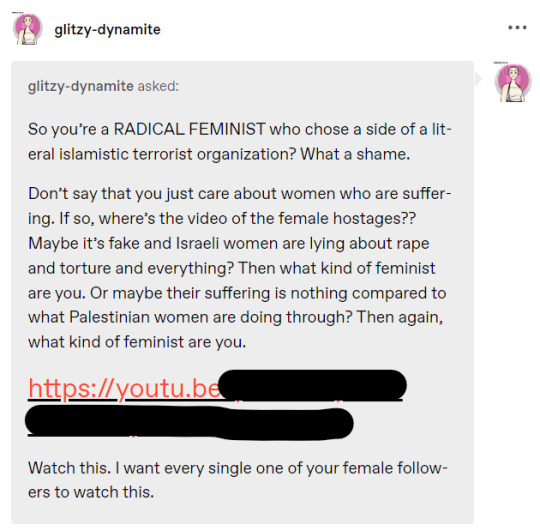
so obviously I'm not going to share the link (which leads to a video of Hamas fighters abusing and terrorising Israeli women), because this is not a gore blog
First of all, I did not choose any sides. This is not a football game. I have said time and time again that I consider Hamas to be a violent islamist organisation which is also homophobic and misogynistic. I am not a fan of any Abrahamic faith as I consider them to be inherently patriarchal.
The rest of the ask is just delusion imo. "Where is the video of the female hostages??" - Why am I required to post a video of a person suffering to acknowledge their suffering? What kind of standard is that?? i have shared one somewhat violent video once, and I have come to regret it and haven't done so since.
"maybe it's fake and Israeli women are lying about rape and torture and everything?" Literally when have I ever said that. After your hallucination of me having supported Hamas, now you imagine that I have accused Israeli women of fabricating their stories. No. I don't think that they have. That's why I never said that lol. On October ninth, I read the UN report on the women's situation in Palestine and made a post about how patriarchal islamist structures are the greatest oppressors of Palestinian women, besides the Israeli government. I have not changed my opinion on that and if you informed yourself, you'd know that
And lastly, you ask me how I can call myself a "radical feminist" if I support the people of Palestine. And I'll tell you; it's easy.
I am a feminist because I believe that gender is a social construct designed to divide and subjugate a certain group of people (women).
I believe that religion is a social construct designed to divide and subjugate a certain group of people (the "non-believers" to whatever religion you believe in).
I believe that nationality is a social construct designed to divide and subjugate a certain group of people (the "stateless", i.e. the Palestinians in this situation).
I believe that race is a social construct designed to divide and subjugate a certain group of people (the "non-whites")
So yeah, how about you, @glitzy-dynamite, consider leaving your ideological bubble and seek help for your persecutory delusion, so we'd be able to have an actual conversation about things that people have actually said, and not just something that you've dreamt or made up in your head
36 notes
·
View notes
Text
... to be honest , still think about assumption that to not enforce ideas of objective reality would mean to allow cruelty and scams to spread without check .
as say in original post in answer to rani , very much can criticise presentation and enforcement of any given construct , without have to accuse base construct as unreal or unimportant . even if given person lie about experience and faith , others may not be at all . to label entire construct as fake only frustrate and push out those who do experience , while those scammers and abusers move onto something else .
but what do this actually look like , to criticise presentation rather than construct ? well , here will introduce crosspost from dreamwidth , february of this year , specifically kossai perspective on topic of crystals and ability to heal .
----
[...] take crystals for example . some people swear by crystals - crystals heal this and that and everything . but ... how ? well , that depend on interaction and connection between energy and physical body . when things in energy out of whack , physical and mental health can follow .
so kossai think - there can be some truth to that , in similar way physical and mental health can play on each other , but how deep is that really ? conclude there is hard limit to this , when consider that no amount of positive thought or energy can actually fix problems like scoliosis . positive frames of mind can to some extent make physical problems easier to deal with , especially with hobbies and outlets , but that alone can not fix .
still there can be minor relief from crystals , especially emotionally , but why ? and this is where answer is variable with individual cases . some crystals have magic and power because people assign and charge that way . others might have inherently , especially if strong spirit within . other times , maybe that crystal is not necessarily special after all , and really anything would do - important part is that this crystal give something tangible to focus on , whether weight , beautiful colours , or lovely texture .
in that , can conclude that people who sell crystals as cure-all either just do not think critically , or actively do not care about consequences , and should push against idea of cure-all . some level of trust in crystals is not inherently bad , but some people take this too far and ( intentionally or not ) allow for others to get hurt .
----
in this post , kossai :
acknowledge base constructs - crystals have some form of energy , and there is some form of energetic body which also need care .
acknowledge that , generally , there is still difference between these constructs - there can be interplay between physical , mental , and energetic alike , but management of physical disability or illness will need more than just mental or energetic changes . if therapy can not make physical pain stop outright , make sense to reason that energetic work can not either , ideas of objectivity and subjectivity aside .
acknowledge different frameworks of this construct - magical and non-magical alike , several ways this statement can be true . still , kossai do not present that any is more correct than another . each of these can be true for different people , and more than one at once may be true for any given person as well .
conclude that ultimate problem here is others' presentation and enforcement of construct - this idea that crystals can cure everything on entirely physical level , and specifically that this is OK to market and promote to others . truthfully , would not know how to feel exactly if someone speak of this experience solely in reference of self , in particular because of scammers - might be genuine , might be victim . however , if there is no attempt to enforce this on others , and genuinely not victim of scam ... then perhaps not business of kossai to feel anything . kossai do not experience that hypothetical life to make accurate judgment call on reality - whether this would be some kind of lie or roleplay , some kind of delusion , just lucky correlation to not have any conditions that need further attention , or whether actually true in some strange magical way .
if people do not try to enforce and assimilate others into constructs , and do not treat others cruelly as result of these constructs , then think that is most important part .
and , yes . sometimes answers will be wrong , and unfortunately , sometimes this can be disastrous . but to address constructs as main problem will only bring frustration and harm outright - and if someone really is in trouble due to these constructs , force of denial will only drive deeper in .
instead , teach people about red flags of scams and abuse , without point fingers . teach people how to recognise internal feelings and signs of trigger , how to step back and avoid situations . and learn how to actually help those who struggle as individuals , not as monolith .
9 notes
·
View notes
Text
broke: i can armchair anyone with cluster b pds just because they’re abusive/manipulative/unpleasant/i don’t like them, lol.
woke: only professionals should diagnose, if you’re a layperson you’re uneducated on the topic and don’t have sufficient understanding to be accurate and unbiased. disorders are a very serious thing you should take very seriously, not just throw around randomly whenever.
bespoke: the psychiatric field is institutionally corrupt as a result of its historical and ongoing construction as an apparatus of oppression. this leads to major blind spots in their ability to understand the experience of marginalized people, including mentally ill and neurodivergent people. much of psychiatric research, not to mention practice, is politically motivated and systematically incentivized to serve the interests of power. thus, many people are wrongly or inaccurately diagnosed with cluster b pds to demonize them or reinforce ideas about criminality, fundamental pathology contributing to their problematicness, justifying oppression, claiming struggles which are results of oppression are actually inherent and biological, etc. on the other hand, many people are underdiagnosed, unidentified, denied help when they’re struggling with a certain illness because psychiatrists are often incompetent and wrong, and with cluster b’s this may apply along a gendered line. this applies for any diagnostic practice, and even for other doctors who are part of the medical-industrial complex. psychiatrists are also disproportionately abusive, and some of this is baked into the cultural norms, intended purposes, and rules and regulations and privileges regarding psychiatric practice. you cannot trust an oppressor class to have the last and most accurate say on the oppressed’s subjectivities and interiorities. furthermore, part of the structure of the institution of academia itself ensures an elitist and hierarchical epistemology. dismantling this and other intersecting oppressions means reaffirming the right of the individual themself to either self-diagnose or self-(non/un)diagnose. existing information or medical professionals should be helpful for doing this better and to improve individual being, and acknowledging the significance or accuracy of their or others’ information accurately is obviously important, but professionals should not be treated as authorities who have the right to wholesale override self-understandings instead of supporting, or to control patients. this is in no way contradictory to opposing armchair diagnoses by underinformed or malicious laypeople who trivialize or misunderstand disorders. however, the problem with such behavior must be located correctly. the inaccuracy is a problem, but that means inaccuracy from actual psychiatrists is also a problem (and it certainly does exist). additionally it might perhaps be helpful to identify saneist armchair-diagnosing laypeople as engaging in behavior similar to that of psychiatrists and both wrong, rather than trying to position them as opposed. the same kind of epistemic overriding and even absurdity is often done by many psychs (and in fact the practice and framework has in large part originated or at least been spread starting from the psychiatric institution itself).
74 notes
·
View notes
Note
There's only so many people a country can support without sacrificing the poeple who actually fucking live there legally. No, I won't think of the children if their parents came to a country illegally.
There's only 2 options. Deporting the parents and the child, or Deporting just the parents. Leaving the kid alone without their parents seems fucking unhinged, no?
Why are you people so allergic to legal immigration? Do you WANT German Christmas Markets on every corner? Is that it? Do you want women raped and murdered in brought daylight? Do you want people set alight on public transport? Because open borders is how you fucking get it.
Okay here in America, we are on stolen land therefore no one can be illegal. No human is illegal especially when the borders crossed them, like they did in America. “Illegal” undocumented immigrants/workers pay more into taxes,social security, Medicare and Medicaid than Americans and billionaire/millionaires do while also being unable to access them. America has fucked up a lot of countries especially in the global south, they don’t want to have to leave their own countries to come here but they have no choice. Parents will do anything to keep their children safe. Sometimes women are human trafficking victims that can’t leave and are raped or ever hear of mail order brides? They can be abused and forced to have babies too, they’re scared to leave their marriages because their status hinges on being married to an American. Children are inherently innocent and vulnerable, they are also our future.
If we deported immigrants the economy would collapse, birth rates would be non existent. We wouldn’t have food on our tables, people wouldn’t have maids/gardeners, or nannies, roofers ,road construction workers, construction workers. I have yet to see any American frothing at the mouth for those jobs. Yeah let’s totally separate families like Germany did in the 1930s, or like America did when slavery was legal, or like Israel does. Children shouldn’t be deported especially if they’re born here and parents have the right to seek asylum. So you want Trumps children deported right? Since they’re all children of immigrants. Hell if Trump gets rid of the 14th amendment then he should also be deported, his grandfather was a German immigrant and his grandmother was a Scottish immigrant. The 14th amendment was also so that slaves could gain citizenship after the American civil war. It was later interpreted by the Supreme Court to include children born of immigrants to also have automatic citizenship after a Chinese American man in the late 1800s, left to visit his family in China and was denied reentry into his own country.
No one is allergic to legal immigration. Asylum seekers have the right to seek asylum in any country they can. Why are you so afraid of immigrants? What would be wrong with having a German Christmas market? Do you not want to share cultures with others? For me it sounds assume that people come here and share their cultures with us. As a third generation Mexican American woman and whose other side literally helped found this country no. But undocumented immigrants aren’t out here raping women in broad daylight as a whole. They want to stay under the radar, the only way to do that is to oh I don’t know not commit crime. Most women are raped by Americans. It’s also unfortunate that an unhoused woman was killed by an undocumented immigrant who was probably suffering from mental illness.
So here’s the last thing I’m going to say to you anon and this is nicer than what I really want to say. If you’re so anti immigration do not eat anything but bland food, or maybe if you can stomach it find indigenous people and ask them for their ancestral knowledge on how to properly cook “American” food. Learn how to sew your own clothes after you learn how to create cloth and thread. Immigrants are not and have never been the problem. At some point your family were also immigrants and they came over when it was easier to immigrate to this country, unless they were Asian or Italian or Irish. Also if you’re religious at all, I’m pretty sure all religions tell you to love your fellow human so do that. Have the day you deserve anon.
12 notes
·
View notes
Text
circle, line
A circle and a line look different, right?

What about now?
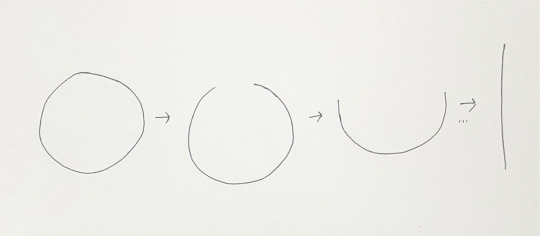
Time in gintama is a useless subject. Unfortunately, it is also a prerequisite to the gintama-human ontology. Thus, with a heavy heart, I look at lines, loops, and other unlikely time-mechanics in order to construct a gintama time for the gintama-human.
Throughout this pseudoscientific inquiry, I locate gintama time– which I eventually call [time], for lack of better notation– in my thematic abuse of two mathematical concepts: irrationality and uncountable infinity. To give away the end, [time] is an uncountable infinity born in irrationality. Which, even to its own creator, makes little sense.
Finally, this is my defense of the gintama time loop. Why? Well, I like loops and loop-like things, and, after all, we want good things to last, to repeat. So this turns out to be a love letter to algebraic topology. Sorry time loop fiction.
Onto more interesting things.
preliminary time notes
To think about time in gintama, I bracket [real world time] from [the narrative structure of gintama, which follows a time] and [time as characters in gintama experience it, i.e. personal time]. The latter two time-categories reflect [real world time] because gintama is written by an author, who, by virtue of existing, lives in [real world time]. That is, while narrative is fun because you can play with reality to make something new (e.g., time loop, time travel, non-chronological narratives in general), creation still requires building blocks, which are ultimately some sort of known assumption, that inevitably require some understanding of actual Time.
All this to say I look at [narrative time] and [personal time] through philosophies about [real world time], which themselves are not especially real; in other words, my methodology is kind of shit.
the situation– personal time
Otae announces the whole of gintama in chapter one.
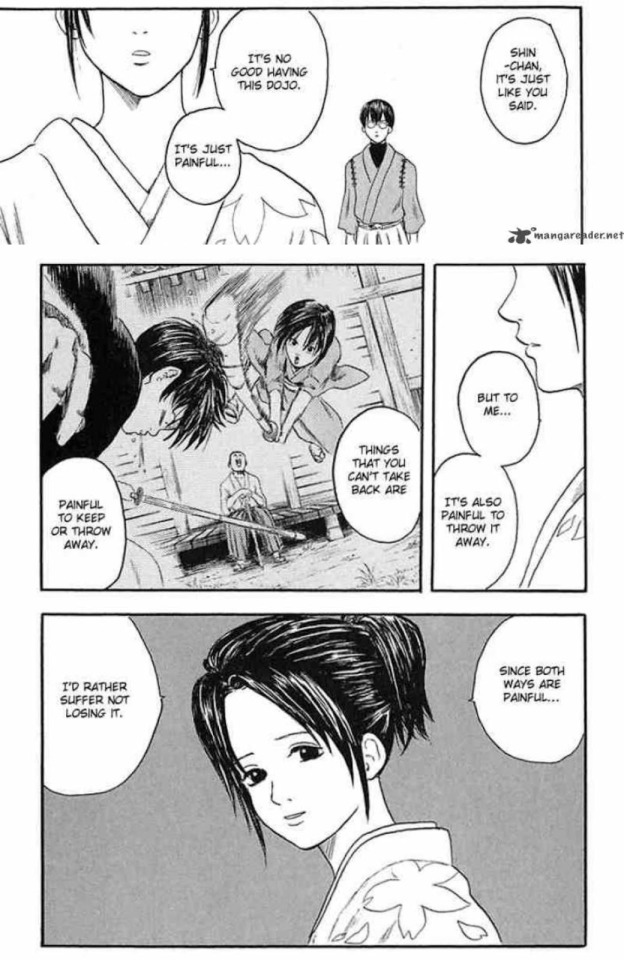
This is gintama’s genetic code.
To speak of time here is to note a few things:
1. amanto possess advanced technology;
2. humans are forced to throw away their physical swords;
3. the sword of the soul.
The sword is a tool*; later chapters tell us that it “carries the soul”. So the sword represents, or, rather, is, something irreplaceable to humanity, that relates to the soul and personhood. This much is corroborated by the plot cycle.
With contrast to the sword, time appears impersonal. We conceive of time, at least scientifically, as the movement between past to present, present to future, stretching infinitely before and after, where our existence does not matter to its flow.
But would “time” exist without anyone to observe it?
Alternatively, how can “time” be experienced as time– as a movement– without anything to measure it?
The human must “create” “time”, if only because it would not be “time” without a person to observe and call it as such. What this person perceives, they conceptualize as movement (measurement); and thus there must be a prior position to reference, or, in the least, a default– a memory.
So “time” requires the present to be given by a prior; that is, for “time” to be experienced, the human who observes it needs already given into a past. The past itself (“knowledge” of the histories that make us who we are, “knowledge” of the tools that allow us to intend various things)– i.e., its inherent “given-ness” to us– depends upon it outliving those who live it. Thus various contexts, with their technologies, arts, and writing (though these are not really separable), function also to contain the essential past-as-memory for those who use and engage with them.
Alright, great, but what does this have to do with the dick-and-balls manga? Nothing, really, except for everything. The amanto (with futuristic technology, in futuristic contexts**) force humans to give up their swords. It would be ridiculous to talk about what the “sword” means here. Suffice to say that it carries (an assumed) cultural-historical weight, an (idealized) memory. We would expect that its dispossession disrupts temporality. And it does– hence the “time loop”.
People love to talk about cyclical time in gintama. It is the same situations, over and over again; that no one ages, injuries heal by the next chapter, and, more than serial-typical regressions, that there is a sense that things won’t work, that important change won’t last, that life “just gets worse and worse”. Time as lasting change– or what we like to call “linear time”– doesn’t feel like it exists.
To return to chapter one. Here the central conflict is not actually between amanto and human; it is between Shinpachi and Otae. Their dying father tells them that even if they give up their physical swords (memory, past), they are not to lose the sword in their soul (?unknown). Sword-less Shinpachi resents him. Rather than “cling to the past”, he tries to adapt to the “linear time” of the amanto: he works in modern food service, gives up on the dojo, and, most importantly, opposes Otae.
What does Otae do? We might expect her to inverse Shinpachi, that is, to “embrace” cyclicality, which would be to give up. She doesn’t. Otae tries to adjust, to make a living and survive, but, unlike her brother, she does so also to protect the “thing she can never take back”. This, as Shinpachi points out, is ridiculous, unrealistic, and makes no sense. And yet it is Otae who is thematically vindicated in the end.
From the first chapter, then, we can construct a sense of [personal time (to the characters)]. Again, for change to exist, there must be a prior form; that is, a certain sort of time is what makes change (technological, political, situational advancement) possible. Further, the self is involved in the process of time. Thus when the self is not whole (lacks the sword), time, and thereby change, becomes cyclical. So “time”, to the amanto, advances, because they can work with their external “selves” (technology, worlds, knowledge-memory) to “make change”. But time, to humanity, loops back on itself, is stopped, because humanity is bereft of its self and can only return to the starting point.
We notice that humans still live in a world where time progresses– where time goes on without them. There is a split between the time of the self and the time of the world. Shinpachi decides to do away with memory and join the world-time, the “linear time”, that is, the time of futuristic technology and change; but his sister, who goes along with this and drags the past with her, does much better.
For a more thorough application of this thought, please rewatch the monkey hunter arc.
*It is also (obviously) a dick. **This reveals some connection between the concepts of “tool”, “context”, and time. Though I say so inverse-facetiously, since nothing about gintama can be taken as if it were serious.
time loop– narrative time
So what about infinity?
Personal time is not infinity. In a first sense, it simply is not infinite– characters die. In a second sense, even considering that memory can be (haphazardly) preserved beyond a lifetime, especially in a story, humanity as a whole is finite– there comes a point, eventually, where no one is left to do the remembering. And in a third sense, personal time is still a string of pasts that were once presents, into futures that will be presents; though this finite string might divide into an infinite number of presents, its divisibility renders it still essentially patterned, which is to say that it is not really “infinity”– it is still mathematically countable.
I mentioned a dysfunction of personal time into cyclical (“un-change-able”) personal time. This is associated with sword-less-ness, equivalently memory-loss, equivalently not being a whole self. The fun of stories is that “character” can be projected into the structure of the story itself; it would make sense for cyclical personal time to have some correspondence to, or at least effect on, narrative time, that is, narrative structure.
At this point I should be more general about the time loop.
The time loop is thought to stand opposed to “linear time” in the stagnation-change, lack-presence, circle(hole)-line([censored]) dichotomy. Specifically, the time loop is opposed to “linear time” in the sense that nothing (usually) changes in a time loop. Or, more exactly, change is slow, nothing gets “better” in any real sense. Again, only where time flows “linearly" can we build off of what is prior, can we intend and achieve a future, can we change for the better (or so we assume). Thus the time loop carries a sort of moral condemnation in its very structure— a karmic debt, if you will.
Characters in plots get thrown into time loops because something has gone wrong. Whether or not they are the direct cause, the character must “figure something out”, “learn a lesson”, that is, address the problem that created the time loop, which will almost always be related to a step within the story of their self-development, in order to escape it. The point of the story is to escape it. This is just how stories go.
Then the gintama narrative “time loop” is barely a time loop. It repeats itself, sure, and no one ages, but that’s because no one should age in a wsj serial and sorachi tried to be funny about it. Still, some lingering sense of futility, or maybe just the sheer repetition of the same event for 16 years of serialization, weighs on anyone who reads it. This kind of feels like time loop fiction; there should be a point to the plot cycles. What are they trying to force Gintoki to do, to show us in his character? What are they aiming for, what is driving the “time loop” in the first place?
Takasugi is driving the time loop.
(More specifically, Takasugi’s crushed eye-ball (soul), his eyelid; inaccessible past (memory), is driving the time loop.)
Another clarification. Personal time is time as experienced by the person; it is pure interiority. Thus, while the world moves on– personal time is time as movement– the person may not.
For the person to move on, they must be able to make change, that is, from a prior form, give birth to the next form. This is because only the person can observe, know, and experience “time”, which itself is a movement (a change in position) from past to present, present to future, that is defined by the person. So change and time-as-movement, within personal time, look synonymous.
Further, movement in personal time requires the given past– the memory, from before me, passed down to me by people and places and things and contexts that I outlive– to be held by me, to be part of the “I”, and thus for my bodily self and my non-embodied self to generate personal time together. In gintama, I locate “memory” as the sword. But gintama’s sword is also part of the Self; so personal time in which the Self can move is only born out of a whole self. Equivalently, personal time is not the Self, but it is intimately related to a change that can only be wrought by the Self, which is to say, both my body and my given memory are necessary to the movement of personal time.
In any case, “gin-tama” is about Gin-toki, and, quite literally, his soul, so we would suspect that narrative time is a projection of Gintoki’s personal time. But narrative time cycles weirdly, and Gintoki still has his sword. Alternatively: if Gintoki was not already a Self, that is, if he had to learn some lesson to become a Self through the time loop, how could he have saved any of the endless roster of villains that conveyor-belts around him? So maybe Gintoki holds his sword without remembering– except that he doesn’t, and the story makes this clear (“I haven’t lost a single thing”). He does, however, seem to possess a slightly different personal time. He and his sword remind antagonists of what they’ve forgotten, and these antagonists sometimes move forward with him into the next cycle. In other words, there is some sort of movement, a change, in the narrative, in the structure, associated with each loop.
But cycles stay cycles, up to a very particular moment.
At which point I revert to the most obvious advantage of narrative time: it interacts with the readers. Gintoki “is” a Self (in the sense that an electron is both a wave and a particle), who carries his sword, who remembers, who hasn’t lost a single thing. Yet the time around him repeats the same events, over and over again. Why? Well, in part for the above: every gintama villain needs to learn the same lesson. But every gintama villain is also Gintoki, and even if he remembers, we don’t. To risk being redundant, we, as readers, have no idea what actually happened to him until chapter 519, when it is fished (unwillingly, I think) out of Takasugi’s eyelid.
Then narrative time functions in several senses. It relates to Gintoki’s personal time, but indirectly; more generally it looks like a projection of the Losers’ personal times, where a Loser is one who has lost their sword. Still every Loser is also Gintoki, and every lost sword is lost memory, and even if Gintoki hasn’t forgotten anything– and even if Gintoki carries his past, his sword, with him– we, the readers, don’t. Surely enough, historical time in gintama only begins after chapter 519. The revelation must precede it.
So the gintama time loop is driven forward by whatever it takes for this memory to be revealed. Each iteration brings us closer, but there is no lesson for Gintoki to learn that would speed this up; the heart of it is that he is waiting, he has to wait, for memory to return, for his past to come back to him, and this past is exactly Takasugi.
Why? Takasugi is the past (his eye, his eyelid, is the past); his eye is therefore Gintoki’s sword, the sword of the soul we need for time to move on. But 10 years jump before Takasugi can make the approach, and even then only from behind. Worse, it takes hundreds more chapters for him to work up the resolve to face Gintoki head on. So if Gintoki somehow constrains the world to cyclical time, equally so does Takasugi.
In short, narrative time cannot move until Takasugi’s eye becomes Gintoki’s sword. Thus half of the loop is about Gintoki always standing up again, always waiting for Takasugi to face him, and the other half of the loop, that is, its motivation, is about Takasugi working up the guts, or whatever he does throughout the series, to finally come at Gintoki* face to face. Yes, I’m equating circles and lines, which is silly. But I did this in the beginning anyways. Rewatch the final.
So why does this matter? Readers well-versed in gintama sword theo-ontology may recognize that the sword which is memory is identical to the sword of the human. This is partly because I’ve defined personal time to require the whole Self (the human) to move, which itself requires both the sword-as-memory and its human wielder. It is also because I’ve equated Takasugi to memory instead of treating him like a character (sorry Takasugi). Nevertheless, creation of the human sword (the memory-sword) is now essential to creating time, and creating time is now equivalent to completing the Self, that is, to becoming “human”. Put another way, Shouyou isn’t killed until Gintoki kills him in 519.
More specifically, Gintoki killing Shouyou undoubtedly completes (undoes) his humanity**. It is also the only way for anyone in gintama to have a future, because it creates, gives birth, to time, the time of the series. Further, its revelation births time in the present just as its actuality births time in the past: the Gintoki who swings his human sword, who cries, in Takasugi’s eye, is the one who swings it at him now. Gintama doesn’t actually timeskip until Gintoki kills Utsuro in silver soul.
Then the movement of time, both personal and narrative, requires three things:
1. a memory-sword (the human sword) (the sword of the soul);
2. a human to wield it;
3. and a decision on how to swing
I have discussed one and two to exhaustion. Now we turn to three.
*Gintoki is always Takasugi, in every case. The inverse holds as well. **It also completes Shouyou’s, but that is for later.
in defense of the time loop
Birthing time looks like an escape from the time loop.
This is where the division between time, self, and change becomes essential. Why does the time loop, in many treatments, depress its readers? For the same reason that any tragedy is depressing: fate, un-change-ability, specifically, un-change-ability of things we want to change.
The time loop is a “literalization” of tragedy. The person trapped in the time loop, at best, loses the ability to determine their future, accomplish their projects, do what they want and have it last, that is, to find lasting (exterior) meaning (this is all exterior). At worst, this person carries their incapacity into a loop that is the same tragedy, over and over again, which they are helpless to prevent or change in any way.
This setup is not exclusive to the time loop– other variations could be immortality, reincarnation, oracles, endless linear eternity, et cetera. In every instance, though, the tragedy is that people cannot change the things that matter. And while the time loop usually removes external change to provoke internal change in its protagonist, gintama characters also struggle with the impossibility of changing themselves.
More generally, though, real time isn’t actually cyclical or linear. We move through time, changing form, towards our death– and so the common thought of time is “linear time”, which is really about “linear change” and an inability to “go back”. But time is only known to us, only countable, because of its cyclicality. There are 60 seconds to a minute; 60 minutes to an hour; 24 hours to the day; and then this repeats the next minute, the next hour, the next day; and then the next month, and then the next season, and then the next year; and then it repeats all over again. Time is only measurable, knowable, existent to us because it repeats. If it wasn’t known beforehand, how could we measure the present, the future, against it? And for it to be knowable, it has to be familiar; and for it to be familiar, we must have encountered it before; and here is the inherent repetition– we can’t stop the cyclicality or flow of time anymore than we can avoid our deaths. Real time makes possible our “change” just as it is unchangeable, just as its existence is conditioned on unchangeability.
Gintama is a story, and story time works differently than real time, so maybe in the story we can separate “linear time” (change-ability) from “cyclical time”, from “time loop” (un-change-ability). Even still, what happens after you escape a time loop? Equivalently, what happens after you escape the tragedy? In the usual time loop– at least the usual time loop in our minds– the loop is escaped into linear time, or, more appropriately, it is escaped into the time where linear change is possible. But why is “linear time” the happy ending? Even granted that it exists (which is questionable), what makes linearity better than repetition, that is, why do people love “linear change”?
The Joui 4 lived “linear time” during the war. They fought enemies, and won. They progressed towards something, and believed in it, too; they were the main characters of a power-scaling, battle-shounen manga. And yet, their linear time ended, or more accurately, was never “linear”. Shouyou’s death, if anything, only proved the inherent impossibility of their shounen dreams. So narrative time twists into defeatist cycles, and Takasugi is doomed forever to repeat, and this is probably more accurate to the condition of the actual world they inhabit, because, most importantly, time was always like this, linear change as linear time never existed.
But again, the tragedy was never about the time loop. From its inception, the tragedy has always been about intentionality versus ruination, “I” as capable actor versus “I” as acted upon, and the utter inability of anyone to change any of this. We want out of the time loop because we can’t do anything; we want out because we can’t act out of ourselves to make external change in any way that lasts. Ultimately, we want out of the time loop because we discover that our intentionality actually means jackshit. The world does what I don’t want it to, and traps me in this; I cannot act, and yet it acts on me. My despair at the exterior world which rivets me to itself quickly translates to despair in, at, my self. I can’t make change, so what does being [x person] matter, so this is my fault, so there’s no point in changing myself, so I can’t change myself in any way that matters, because even if I do everything right, there’s no meaningful effect on the world that holds me captive, et cetera. Thus everyone wants out of the tragedy, the time loop.
Including gintama villains, who usually try to get out of it by killing themselves. This never works.
The time loop is tragic because it makes its inhabitants absolutely passive to it and acts on them eternally. The gintama cast is supposedly full of “losers”; its villain of the week, while beating Gintoki, calls him a masterless dog, a ghost, the one who lost, along with the rest of the samurai, et cetera; and the loser here is inherently passive against a winning actor. Nevermind that Gintoki never fought for the Romantic Japan that lost to the amanto– his loss is even more infinite for the narrowness of its scope.
And yet, you’re not supposed to kill yourself.
Escaping the time loop– or, more generally, the tragedy– never guarantees linear time, because we always have to end the book on the happily ever after. So what really happens after you escape the time loop– is linear time actually a relief? Either things start going wrong, which isn’t the linear time ideal, or you achieve every dream, you make possible every impossibility, and come to the end of the infinite series by continuing on within it infinitely. Is that really “happy”?
Alternatively: the cycles of narrative time drive towards the birth of a new time. But the tragedy of the cycles is intentionality/ruination, and the cycles can’t be escaped into their “opposite”. Gintoki, a human, with a human sword, kills Shouyou, and thereby brought forth a new time. And yet, this new time was still cyclical.
Then what’s the solution– killing yourself? Takasugi, repetition Personified, asks this to Gintoki the entire series. Why won’t you stay down?, [Why are you crying?], [Why can’t I comfort you?], Why keep living in this world? Villainy aside, he does have a point– if you look carefully, living in the gintama world is incredibly, incredibly stupid.
Gintoki says: no matter how many times I fall, no matter how many times I fight the same fight over and over again, no matter if it never ends, I will always stand up.
This is the height of stupidity.
[time]
So narrative cycles aim at the revelation of Gintoki’s memory, which would identify sword with eye, tool with wielder, that is, complete the “human”, and thereby give birth to a new (non-linear) time.
Here we get to mathematical infinity.
Mathematical infinity is not a number, or even properly a concept. It’s more like a sign at the edge of a cliff that says, there’s a cliff here, here’s the end of the world– except that this sign also signifies whatever, and everything, that might lie beyond the cliff, which cannot really be called “essence”, or even be said to exist in the first place. In other words, infinity is a marker for a point of no return, that in of itself is nothing.
Some things are said to be “infinite”. Usually, these are patterns. A line is infinite, as is a parabola; but these infinities are predictable, that is, countable, because patterns are rules. Their comprehensibility allows us to treat them like fancy numbers.
Conversely, some functions decompose into situations that are entirely ungraspable. This edge of knowledge, where it devolves into paradox and nonsense, looks like uncountable infinity.
Uncountable infinity is the infinity whose name itself means nothing. It signifies to something that is, by axiom, impossible impossibility, ungraspable. When infinity “interacts” with the mathematical world– or, rather, when we push far enough to reach it– we come to paradox, chaos, and unintelligibility. Certainly, science could advance sufficiently to reconcile the mysteries of particle physics; but the fun of mathematical concepts is that you can define them in any way you like, even if they’re fake. And uncountable infinity is, by my definition, the “thing” that is always uncountable.
So gintama narrative cycles aim at something, while those in cyclical personal times suffer for them. Cycles, better, change-less-ness, correspond to sword-less-ness, to lack of memory, and historical time only “restarts” when Takasugi brings us the past. Et cetera, et cetera, et cetera.
This doesn’t mean our new time won’t be cyclical.
In the end, “time” is associated with sense of Self. This is an unavoidable relation, because time is a human word, in a human language, that describes what is ultimately only known to us as human experience. But “Self” is (itself) a problematic concept. After all, what determines one’s Self? Relatedly, who, and/or what, and/or where, and/or why, gets to possess Selves at all?
Within concepts of Self is often embedded an instinct towards differentiation. The (western philosophical) impulse is to originate this difference in agency: that is, through my free determination of my Will, my Projects, my Actions, and et cetera, I differentiate “I” from “other” and thereby constitute Me. Needless to say, concepts of “agency” are inextricably linked to “change”. Thus, in this particular conception, “time” is bound to “Self”, is bound to “agency”, is bound to “change”, and to invoke any one is to invoke the other three.
Here, “knowing” (as agency) finds itself imperiled. That is, though the “unknowable” would strip agents of acting-ability, “knowing” would also consign existence, life, the universe, et cetera, to determinism. In both cases, “(un)-knowledge” renders the agent passive. Thus someone might long for an unknowable magic in order to undo determinism, just as they might long for the knowledge to successfully determine their life; yet the one who longs for agency could find agency a disappointment, a not-agency. Equally, if the time loop embodies both desires before they collapse into paradox (I can continue into the unknown future if I escape; something is tying me down, my knowledge is insufficient to escape), “linear time” does so as well.
But now we return to infinity, to irrationality, to uncountability, in short, to paradox. The bulk of the previous 5000 words has been to determine that the dichotomy is false. To be straight, knowing and not knowing, agent and non-agent, the linear and the cyclical, are not separable from each other. Their binary is an illusion, and the suggestion of one carries within it the absence of the other; they are synonymous at the exact and every moment they are not. Clearly, this is not not-knowing, and not knowing, and not not-either of them at the same time. I call this uncountable infinity, the mathematically irrational.
The mathematically irrational is paradox. Consider: we can graph, and look at, certain functions, and yet never grasp their value (put x(sin(1/x)) into desmos). Similarly, we know exactly what “pi” is– the ratio of a circle’s circumference to its diameter– and we can define it, use it, find it in every instance. And yet, pi is an irrational number, because its decimals trail off into uncountable infinity. Knowing and not-knowing, united in the same action: irrationality is knowing in not-knowing, not-knowing in knowing, and also neither.
I will be ridiculous and find this paradox in gintama. I want to claim, in the first place, that the self never generated time at all; in the second, that this is never irreducible to agent/acted, knowing/unknown; and in the third, that time is generated by [time]. To do so, we must investigate the moment of its birth, in 519.
the cliff—519
Tools, given memory, etc., together with the persons who hold them, produce an actor-self, a time of possible change (a “linear” time). It is in 519 that Takasugi finally faces the camera.
Now Gintoki grasps the sword (memory, Takasugi). This should give us “linear” time.
But 519 is not so willing. Where we hope for capable agency, we find none. Instead linear/cyclical, active/passive, presence/distance, collapse into irrationality.
Take the archetypical moment. To Takasugi’s why, Gintoki says he’ll stand up. Specifically, he says, too bad– I (you) won’t fall.
Standing up is what Gintoki (a person, with a sword) does. It is how he defeats each suicidal villain, kills Shouyou, and kills Shouyou and Takasugi all over again. This is what the “time loop” would require of him.
Gintama antagonists, those paragons of rationality, tell us that it is irrational.
Otae is also irrational. Her irrationality doesn’t fix anything (⇔escape cyclical time, make change), and she knows so herself– “If I’ll suffer either way, I’d rather suffer protecting it.” 518 chapters later, Gintoki says: “I won’t fall until you [Takasugi] fall, until you stop, no matter how many times it takes, I’ll stand up again… even if I have to walk over my teacher’s corpse, even if I have to walk over your corpse, I’ll protect his disciple, our companion, Shoka Sonjuku’s Takasugi Shinsuke, his soul.”
So Gintoki stand(ing)s up until something– until Takasugi stops, until time is born– in order to protect Takasugi’s soul. This might look like an “end” to the cycle, but it doesn’t feel like one. “Even if I have to walk over your corpse”?
Alternatively, “saving” Takasugi should be the change that the cycles want to make, that would break them in any normal work of time loop fiction. It is “agency” (capable action, material change) at its purest. But Gintoki says he will stand up and kill Takasugi and stand up again. No matter how many times the same thing repeats, no matter if time never moves on, no matter if he is forced to kill the very person he’s trying to protect, Gintoki will stand up. How could Gintoki possibly care about escaping any cycle, when he is the one “perpetuating it”?
So gintama is not actually about escaping the time loop, which is the rational thing to do. Gintama is about, do you have the strength to keep living in the time loop, even if it never ends?, or, do you have the strength to kill your teacher and your friend, and lose everything all over again?, or, do you have the strength to eternally suffer for the thing that can never be taken back? In short: forget the capable actor– gintama is about being foolish, and irrational, and embracing the time loop by standing up.
If we look to chapter one, [standing up] is [protecting the thing that can’t be taken back]. Neither can be appropriately confined to cyclical or linear time. Otae says she’ll suffer either way, and Gintoki says he stands up to protect what Shouyou held precious, Takasugi’s soul.
Otae protects a thing that cannot be taken back. This is the past. Gintoki acts for– and this is also a protecting– the past. Takasugi is, in a literal sense, pierced by this past every moment of his life.
The past that we can recover, that we can fully integrate into ourselves, is the past that can be used to generate the future in “time”. Thus “accepting” the past “to move on” – accepting, making entirely part of oneself, making entirely interior – because only then can the past become knowable, comprehensible, and usable. The person must accept their past to change things, i.e., to make linear time. Time, change, and agency coincide.
Yet Otae’s past “cannot be taken back”. Certainly, even the accepted past cannot be “returned” to. But Otae’s past is the past that pierces Takasugi’s eye– that is, the past whose “revelation”, whose self-same existence, drives the completion/generation of gintama time itself.
So this is the past that “cannot be taken back”, in more than the literal sense. Takasugi is scandalized by its distance, even as he dies satisfied; Gintoki, ever-silent, still loses his composure at its provocation, is emptied by it, cries in 519 (in all of gintama), in 703. It is a past that refuses total use or incorporation; instead it acts on those who carry it, even after person is reconciled to sword (to its memory).
Its paradox in position. Though “the past” is always present (“I haven’t lost anything”, “how long will you keep looking at that crushed eye of yours”), it is simultaneously kept from us by an irreparable distance. Distance, of course, suggests space, which itself suggests a space that is surpassable. But this distance is not spatial– it is temporal. Gintoki carries the past, yet never reveals it to anyone, much less to us; in the end it is Takasugi who has to do the revealing, and even then only after 500 chapters. Further, its revelation actually increases the distance. We grow used to our proximity to Gintoki’s “point of view”, to our role, through him, as protagonist of the story; and here his defining moment is told not through his eyes, but through the eyes of the distant antagonist, whose breaking point is the discovery of the distance between him and Gintoki. Gintoki is reflected– more, revealed to have always been– across a distance that is unsurpassable.
This distance is equally time, because Takasugi and Gintoki were separated always, and only, by “the 10 years”. Takasugi comes to Edo– there is nothing stopping him, spatially, no physical restriction or meaningful law imposed, from making the approach– and yet he cannot make it. Or so we assume. We only know its universal separation axiom: 10 years, a distance between two points that could never be overcome or recuperated.
So the past is across an unsurpassable distance. In this sense, it cannot be taken back. It is simultaneously carried in, pierces, Takasugi’s eye, who struggles because he cannot reconcile it to himself. Just as it is always with him– “every time I look, the beast…”– it is also the one thing he cannot bear to see (your crying face). Though its revelation is necessary to New time, it is also what sent time into irregularity in the first place. And though it is irreparably distant, it pierces every moment of the present, which is to say: it degrades time, it makes things weird.
Its paradox in times. The cliff is pre-originary to everything by narrative position. Gintama narrative cycles press towards its revelation as first dilemma. It is before even the corpse field, before anything else. It drives each time Gintoki swings his sword and reenacts it. The very first moment that Shouyou finds Gintoki, is predated, predicated upon, generated, made possible by, the fact that Gintoki kills him with his sword.
From this past, Gintoki is (in the verb sense). It is ahead of him (in 519) and behind him (before 1). For its sake he “acts” towards a “change” (stands up) that he knows is impossible (“if I have to walk over even your corpse”*). In other words, for sake of this past, Gintoki lives as if he belongs to a “linear” time, even as he knows he doesn’t. The past brings forth itself again.
Finally, its paradox in agency. What is burned onto Takasugi’s eyelid is a single moment he cannot recover or recuperate. Instead, this moment acts on him, it pierces him, against his will. This sort of past is not an empty concept, that could be filled with any given circumstance. Takasugi is tortured because the content matters– because what happens on the cliff that day, matters.
The cliff is not what Takasugi, Gintoki, Shouyou, or anyone else, wanted. Worse, it is not what they fought for: Takasugi to save Shouyou, Gintoki to protect Shouyou’s disciples (in an act that he knows will destroy them), Shouyou to protect his children. Instead Takasugi is stripped of agency, and the eye that would acquire it; in the present he acts on everything because he is, in every moment, acted on. Equally, just as Shouyou tries to protect his students, he destroys them, and Gintoki, who is forced (acted on) to choose (acts on) between two wrongs, two denials of his self** (of linearity), that is, two losses, is the classic agent paradox most of all.
So the past cannot be taken back, and this not only in the sense that no one can return to it. The past cannot be taken back as a memory, nor can it be incorporated as part of the self, nor can it function as the essential memory that projects forward normal time, even as it is known at every single moment. It cannot be domesticated.
Gintoki killing Shouyou, and crying, is unacceptable. It is distance itself, just as it is proximity; it is simultaneously known (Takasugi sees it), unknown (no one can reconcile it), and neither (we still move on). It should not have happened. It is irrationality itself.
And yet, by virtue of being “a past”, in its relation to the present, in its position as driving force of the time of the entire series, it still is time. The human, with the human sword, who cuts off someone’s head, is [time] itself.
Clearly, this is something outside of normal time. The question becomes, who needs to be killed, and where, and why?
The one who gives birth to a future.
*–and he does.
**“No need. They’ll never hold a sword again.”
the future
That Gintoki kills Shouyou is essential.
The start of gintama’s “historical timeline” is the corpse field. Here the time that Gintoki sits in carries a heavy sense of eternity. The moment where Shouyou finds him could be forever; historical time is out of place.
What breaks this time is very particular. It is not that person and sword = human = time in the automatic sense, because Gintoki, who holds a successful sword (“before meeting you, I never lost to an adult”), remains inhuman. Rather, Shouyou, a human (to Gintoki), must give his sword to Gintoki for time to start. This is also what makes Gintoki human. Gintoki, the human, had to be given his humanity– and thereby time– by someone else.
Equivalently, it is not enough for gintama’s [being human] that the right person holds the right sword. Only a human can progress time, that is, give birth to the future, but reconciling self to past, sword to eye, escaping the time loop, is insufficient. That Shouyou finds Gintoki is predicated by the cliff; sword can only become eye through the cliff’s revelation (and the cliff happens concurrently); self and past are reconciled only after Gintoki kills Takasugi; and the Shimura dojo is restored only once the Shimura siblings kill their mentor. It isn’t enough just to hold the sword– you have to actually swing it.
This swing must be something irrational, because everything else is just the natural extension of a person with a sword (it is the person and the sword). Further, the person must make the swing themselves. For it to be a swing they make, they need to choose it. So the swing is a decision made in irrationality.
Swinging a sword at– beheading someone— who is clearly the irrational choice. What goes against the logic of the world, of time, of all the meaning you sought after? Gintoki fought to protect Shouyou’s disciples; but Takasugi tells us that he wanted to save Shouyou more than anyone. Narrative logic says that Shouyou’s disciples should die to save him, and the logic of their linear time– their humanities and their swords– is to rescue Shouyou and progress into the future. Gintoki swings against everything. And cries.
Gintoki stands up, is irrational, for the past that can never be taken back. This past completes his humanity (person, sword, swing) in the moment that it ruins it (he cries). Gintoki kills the one before him(先生) to make them the one behind (into the past); which itself is a loop, is a cycle, but also a line. It is a [being human] that gives birth to an irrational time.
Gintoki kills Shouyou even though it changes nothing. How does this birth time? “Time” comes out of a self, but Gintoki loses his self; “time” is what renders change possible, but Gintoki cannot “save” Shouyou or Takasugi. Certainly Gintoki knows this, and kills Shouyou in spite of it. But how does this bring forth a future at all?
Gintoki does kill Shouyou for something, for some reason, and this is concretely the survival (into the future) of Shouyou’s disciples. Abstractly, though the purpose is less clear– “even if I have to walk over your corpse” – it is still what drives (is the purpose of) every instance that Gintoki, or anyone, stands up.
Gintoki’s purpose is Shouyou’s purpose, and Shouyou dies to give birth to the “future” (a future that is born in irrationality). So when Utsuro comes to kill him, Shouyou sees also Gintoki, and smiles. Sakamoto calls this “hope”.
We are told that Shouyou gives birth to hope– his students– almost as if to invoke the analogy. Shouyou’s disciples– his “children” – are him, because he gave birth to them, and they are not him, because they have a futurity beyond his imagination. Equally, this future is knowable, because the child is you, and time repeats, just as it is not, because the child is not you, and you will not be there to see it. This is the substance of “hope”.
With regards to the structure of his world, his time, and perhaps even his own humanity, Gintoki makes the irrational choice: he stands up. But to stand up is actually for, to give birth to, the uncountable future. Sakamoto tells us that Gintoki “gives birth” to this future in every shounen-bond he ever makes. And here is the paradox, something more generative than irrational dilemma– Gintoki’s “descendants” inherit his soul to be in ways unimaginable to him.
This future pierces every moment, and in the same moment it escapes. Take that Shouyou knows, and cannot know, what his disciples will be. Their possibility is imaginable, in the sense that he can delineate it– “I hope you all find your own bushidous” – but it is also uncountably infinite, because your child is not you and not beholden to your patterns. Equivalently, Otae’s happy memories end when her father dies, but she still keeps the sword of her soul, this unspeakable thing, that past, and it is her purpose in standing up.
Gintoki, with the sword he has been given by a human, kills Shouyou. This gives birth to an uncountable future– uncountable because it is born in irrationality, beyond the possibilities and expectations of pattern, either linear or cyclic– that is an uncountable infinity, and this is [time]. [time] drives, again, pierces, every second of all of time, and in the same moment it escapes. It is also irreparably beyond the one who births it. This is why gintama had to end.
So the human is constituted in the moment of death (⇔the moment of irrational swing), which is to release the future— [time]. In the same moment, humanity, and [time], escapes. But the moment of constitution (⇔ [time]) is what births the next instance of being human, that is, the rest of time.
In the moment before Gintoki’s irrational swing, each [time] was truly infinite. Here possibility is as unthinkable as Gintoki’s heart; there is no better way I can describe this than an uncountable infinity. Gintoki did what he should have (not) (not) have done. Neither he, nor Shouyou, nor Takasugi, Katsura, Oboro, or anyone, could have imagined any possibility for the future that was to come. In its sheer impossibility, this was infinity: the past that cannot be taken back.
But the past that cannot be taken back is also the sword of the soul. By definition, this generates an impossible impossibility, that slips away as soon as it is born; and as the uncountable, that is, the mother of all irrationality, and also its child, [time] has little to say about lines or circles, aside from that they are essentially the same. So gintama never cared about time loops or not: all that matters is if you follow [time] by standing up.
When Gintoki recovers his sword (Takasugi’s eye, Takasugi), he does so amidst a wreckage that looks like pine trees, as Takasugi (the one who finally stood before him, who now will stand behind) dies in his arms. Here, we find that the “cycle” repeats: Gintoki stands up, and the sun rises.
This is the dawn of a new, impossible day.
I don’t think that’s so bad.
#4 months later. i cant articulate the suffering this has brought me. anyways. happy 5 years since 703 LOL#goose tag#gintama
30 notes
·
View notes
Note
Saying “this person was violent, therefore they’re evil” is easy. But it doesn’t stop the cycle. And it often ends up reinforcing classist or ableist ideas that say people from certain backgrounds are just inherently bad or dangerous. You can care about victims without dehumanizing the people who’ve been failed by every system meant to help them
Okay but saying this one particular person did something wrong is different from saying the entire group is dangerous. I don't know what race or ethnicity you are not here you are the one equation people pointing out to one very particular person to somehow reinforcing that all people of his background are dangerous. No one said that.
I do get that twitter generally lacks nuance in most things and they aren't handling the things regarding Mike and V well, they never handle anything well but you are also, not acknowledging the fact that most people are not going to look at the fact that someone shot his gf ( who I'm pretty sure would likely be of similar background ) and then react positively to somehow telling them to consider their "background" as if grown adults don't have free will. We can talk about the circle of crime without letting go of the fact that abuse and violence perpetrated is still an act of free will.
I feel like you’re responding to an argument I never made. No one said “this one person did something wrong, which means his entire group is dangerous.” what I said is that this is exactly how society reads violence when it comes from marginalized people. That’s not me projecting something onto this conversation, it’s how the media/the justice system/the public have operated forever. You say “no one said that,” but that’s kind of the problem, it’s not always explicitly said. It’s implied, it’s baked into our reactions, it’s how people generalize when certain groups are involved in crime. If we don’t acknowledge that we’re just pretending violence exists in some neutral vacuum and it doesn’t. people have free will. I never denied that. but free will doesn’t mean people exist untouched by their circumstances. poverty, trauma, systemic neglect, cycles of violence, they’re real forces that shape people’s behavior long before they’re even conscious of it. Recognizing that is not “excusing” what V did. It’s understanding what creates people like him so we don’t just keep reacting after the damage is done. Also, bringing up my race or ethnicity in the middle of all this as if that determines whether I’m allowed to make systemic observations is crazy lol. I’m not sure what you were trying to achieve there but it came off more as a weird attempt to discredit my point than anything constructive. this is not about whether one person is bad/good. this is about refusing to participate in the same classist and ableist cycles that only allow sympathy to exist when someone’s struggle is packaged in a non-threatening way.
V’s actions were violent. No one said they weren’t. But when we decide he’s undeserving of any humanity or analysis because of what he did especially knowing where he comes from, we’re not seeking justice. we’re just looking for clean villains to punish so we can feel better about a clown world
5 notes
·
View notes
Text
Introduction Post
My pronouns are he/him/his only. I broadly identify as agender.
While I think gender is a human-fabricated construct with no absolute "material reality," as in: objectivity (Think in the way gender is seen as inherent to assigned sex.), I am not "gender critical" or some form of "gender abolitionist" in the slightest bit.
I have been educating myself on feminism for years, and have found myself aligned with Eco-Feminism and Anarcha-Feminism.
Matters I am willing to debate (but will likely not change my perspective on):
I believe in anti-transmasculinity/manhood as terminology used to describe transmasculine people and transgender men's experiences with specialised oppression. My solidarity extends to all marginalised men and the (obviously non-misogynistic) terminology they coin to describe their experiences.
I believe the terminology "TMA/TME" to be binary and useless. I have much more to say, but the sentence above sums up my thoughts.
I do not believe any transgender man can ever possess the same male privileges (perisex) cisgender men are (at times, conditionally) granted by society.
Matters I am not willing to debate:
I do not believe in "female, AFAB/AMAB, and cissexual privileges."
I do not support "men's rights activists" or any prejudiced "feminists," including "radical feminists" and "female/lesbian separatists."
I am pro-Palestinian liberation 🇵🇸 and anti-Zionist. I do not support the concept of a "two-state solution," as settlers, time and time again, have proven themselves unable to "share land" with Indigenous populations. I, to clarify, due to unwarranted and weaponised misconception, do not support anti-Semitism and anti-Judaism. I, as always, believe in everyone's right to security and safety, but never at the expense of others. I will not allow anyone to engage in bigotry/prejudice, if done under my own post, where I have the power to remove comments. Please, do not jump to conclusions. If you decide to, anyways: merely block me.
I am pro-Human rights and understand (reactionary) hatred as not only reductive, but simply not justifiable or logical.
Links (Mutual Aid):
Help Talya, a Black non-binary survivor of child trafficking: https://www.paypal.com/paypalme/talyai
Help a transmasculine parent and their autistic son: https://gofund.me/e825d6c6
Help a teenage Black girl overcome abuse and injury: https://gofund.me/7168ecbf
Help a WLW couple in need of a home: https://gofund.me/b85ef905
Help Hannah, a woman with epilepsy and severe POTS, with medical expenses: https://gofund.me/18c7d8ff
12 notes
·
View notes
Text
So I had a conversation with my psychiatrist where she started trying to shill Silberman's Neurotribes to me, thinking she's introducing me to the concept of neurodiversity and the neurodivergent label lol.
I'm politely dodging, "sure I'll check it out," blah blah blah, but she's really insisting on this shit.
It's her first exposure to a disabled history and disability advocacy rhetoric lol. And of course it's fucking Neurotribes, the American rebranding of Wolfsenberger's social role valorization, something that seeks a comfortably American individualist explanation and response to a systemically manufactured concept.
Fucking McDonalds people man.
anyway
When it comes to psychosocial disability, so much of what are core concepts and texts to the liberation movement emerged from the psychiatric survivor movement of the 1960s-1970s. This was, obvously, tied directly into deinstitutionalisation with the specific focus of combating the systematic abuse inherent in psychiatry. See, at the time and in many ways today, psychiatry dehumanizes/d and thus often abuses patients. This is, bluntly, due to the inherent power imbalance of practicing medicine on subjects who's ability to revoke or deny consent is considered legally and ethically dubious. This shit is obvious but is treated by people who profit off of this system as some kind of irreconcilable and irresolvable reality we must live with.
Sort of like how people who own or profit from prisons consider crime impossible to resolve without them and therefore we shouldn't investigate how the majority of people at Riker's don't have a conviction oop. That's another thing, you cannot have meaningful deinstitutionalist conversations without learning at least a little about prison abolition, another concept people consider cuhraaazy, because it has become impossible to imagine life before prisons.
Anyway, part of the reason psychiatrists often engage with this shit because obviously it starts from the context of "you suck and are bad actually." The kind of person who spends twelve years studying, spending money, passing exams, doing exploitative residencies, etc. to become a psychiatrist is not open to the idea that all of this effort was in service of becoming a state-appointed abuser lol. They instead seek to construct non-abusive practice via the slow and often ineffectual evolution of medical ethics and "best practices."
I would say that obviously there are complex conversations about this, but the thing is, those conversations happen within psychiatry, without engagement with the medicalized population.
To demonstrate what I mean, a current drama unfolding in the field and concurrently in the schizophrenic world is that uh oh, evidence has emerged that long-term antipsychotic use leads to possibly permanent brain shrinkage. Yikes!
And it's known that antipsychotics are associated with much higher rates of diabetes. Uh oh!
That's the kind of thing the medical complex would probably invest more into researching so that we can form a clear and coherent picture of how that all actually functions, the full scope of the effect, whether it's reversible with time off of antipsychotics, practices to ensure that potential harm is minimalized, yadda yadda.
Except, there's obstruction within the field, partially driven by capitalist incentives, but partially as a result of the attitude within psychiatry that societal answers to these issues cannot and do not exist. Psychiatry is, at its core, based on the individualized treatment of incorrect people, people with conditions psychiatrists label diseases to be treated, right. Liberal psychiatrists will discuss concepts like shit life syndrome, that is someone who's condition is effectively untreatable because they're some combination of fucked circumstances that can't be dosed away. Psychiatrists do not come out in active support of reform toward social model practices, however, and in fact the institution of psychiatry hosts countless psychiatrists who instead seek to answer shit life syndorme by returning directly to institutions.
They say this in the same breath that they discuss concepts of inevitable suicide, a eugenicist concept that even if you do the best psychology/iatry ever, some people are just that magical combination of poor, marginalized, and genetically predisposed to killing themselves. Don't cry, OK? They just had bad genes.
And neurodiversity as a movement convinces people that fucking Netflix specials and rainbow infinity signs mean anything, by centering low support needs autistic "geeks" who have a special interest in Sailor Moon and beanie babies. It distorts the history and separates us from the very real, always looming threat of these institutionalist practices. It sells social role valorization, a concept that has broadly failed in sociological contexts, as the answer to these incredible problems, by shifting the onus from state-approved institutionalised realities to like...
people being mean to you because you remember every Star Trek episode Commander Data is just like me fr.
I fucking hate Steve Silberman lol.
Anyway, as a disclaimer, I am not antipsychiatry in the sense of being anti-medicine. Sometimes medicine works for people. It didn't work for me and maybe I'm just hurt by that, I don't know, but I do know a psychiatrist would just give me antidepressants and tell me to think better thoughts about that lol.
2 notes
·
View notes
Note
I’m so so sorry this is going to be a really long rant but !!!! FUCK !!!! I’ve been desperate for this conversation.
We had a dinner guest very confidently say, word for word, that health is a colonial concept. Queue a chorus of tongue to the top-teeth disapproving *clicks* and the sound of my grandmother decisively putting her fork down. The questions started coming with an underlying tone of absolute distain. “What is health?” “Do you mean the healthcare system?” “Do you see an alternative here?” “Do you know why there isn’t one?” “Are you aware we fight tooth and nail for access to this so-called colonial concept and the system that facilitates it?”
Immediately this white girl is shaking in her boots (I don’t blame her, my grandma is 58, capable of lifting a car, and probably of scalping a dinner guest if the need ever arose). But it became so obviously clear over the course of her attempt to explain that what she meant is “native culture is unhealthy, health is a deviation from and erasure of native culture” which is, uhhhh, bullshit. I feel like so many people (liberal and upper class white women in particular) see a facet of colonial society that isn’t equally represented in minority communities and then interpret it as being a colonial invention as opposed to a colonial privilege. The same goes for “settled dwelling is a colonial concept” no it isn’t, lots of us did that for centuries, it just sucks now because a colonial system got dropped on top of the practice. Saying health, housing, parenting, etc are Colonial Concepts is saying outright that you cannot envision indigenous people as presently or historically capable of upholding those ideals in an equal capacity.
Progressive language does not negate the inherent infantilisation or racism of that belief. Furthermore, treating liberation from the material and social suffering of our condition as a deviation from our culture betrays the fact that you understand it exclusively from the perspective of colonial power and abuse. Thus, native culture (and african american culture) becomes, in the eyes of white liberals, synonymous with what was inflicted upon us as opposed to who we are. How dare we aspire towards health when to do so is a betrayal of our culture? Our culture being traumatisation, grief, victimhood, and above all else, a necessary social technology of both white guilt and white liberal saviourship.
Wow. Do NOT apologize for this! You are a great writer and your arguments are excellent.
I’ve been thinking about these connections a lot too. A very strong example of how consumption impacts health (I can’t believe I actually have to say that) and how these health conditions (including how these problems are managed) affect different groups in different ways are food swamps. Food swamps are areas that have little access to nutritious food, caused by factors such as cost and physical availability. In North America, native people and black people are significantly more likely to live in food swamps. These populations are less valued and seen as expendable.
It is well established that consumption of highly-processed food leads to negative health outcomes. However, the people who follow the rhetoric of positions such as “health is a colonial construct” (It’s not - health exists as a spectrum, and the delineation of healthy and unhealthy may be highly variable. This is not the same thing as non-existence) are also the ones who deny the cause and effect nature of health. This misinformation is especially harmful in places with a high population of people who are already marginalized. No one benefits from the insistence that diet does not influence disease…except for the corporations making people sick.
Food companies are not your friends. Pharmaceutical companies are not your friends. Preventative diseases line their pockets. Your wellbeing and that of others needs to come before their profit.
12 notes
·
View notes
Note
This whole thread is so....
https://twitter.com/orikkunn/status/1754831427903074488?t=WbVE9Fu585pxZFXPbr_JlQ&s=19
It's pissing me off actually and I search the word hijab on their account and in one of their tweets they said "I think hijab is a bad thing" ??? I need non-muslims who speak on Islam without any knowledge to stfu
i'm going to apologize beforehand if this is upsetting in any way bc i'm sure you were expecting a different response but while i feel like op's wording could have been better in this thread specifically—i like their wording in this thread more—i do generally agree with them. i definitely understand there's a gut reaction to any critique of islamic practices esp in the context of modern orientalism and islamophobic sentiment, but i also think that muslims (and people of any religious faith, really) can simultaneously acknowledge that some criticisms of faith, while driven by racism and/or xenophobia, are also validly driven by a worthwhile contention with women's material circumstances over the course of history. in the other thread i linked above i think op is very much correct in that it's not constructive nor useful to criticize individual people. many individuals do choose to dress more modestly of their own volition and are privileged enough to have that available to them as a choice and nothing more bc of the environment they grow up in and the familial interpretation of religious tenets they're taught. but i don't think people are wrong when they acknowledge the larger context within which women are advised to dress modestly and how those standards of modest dress compare with those imposed on men in comparison. there's an undeniable dichotomy there and at least in my islamic upbringing i've been taught that the way some of these things diverge along the lines of gender is preordained and not meant to be perceived as inherently oppressive towards one gender or the other. a thing is simply bc it is. but religion isn't really something you can view within a vacuum much as that would be ideal. it is connected to the material circumstances of women in the real world and i do allow myself to sit with that reality even if it's weird to process at times bc i still consider myself a muslim and have no plans on ex-communicating myself
personally i like to dress modestly in the sense that i don't wear very exposing clothing. i've grown up wearing pants for my entire life. my parents are lax enough that i'm allowed to wear t-shirts but i can't wear anything where my armpits are directly exposed so that means no sleeveless tops. i can't wear anything with a deep neckline either unless i have a higher positioned undershirt on underneath. and again, i'm not particularly bothered by any of that. i do toe the line on a few occasions but generally i'm ok with how i dress bc by now i'm used to it. that being said, i know the reason i've come to be okay with dressing this way is bc it's how i was taught to dress, and towards the specific end of maintaining modesty and emphasizing on the shape of my figure as minimally as is possible without having to outright wear a bag lol. that is at large a structural reality of muslim practice towards women, regardless of what individual women choose to do in their own homes where they have the liberty to choose. and as i mentioned above, i do think we have to sit with that reality even if we acknowledge it opens us up to abuse by other people who may not have the best intentions. this is why, for example, i've really come to frown upon the way ex-muslims (esp when they're women) are almost mocked by the extant muslim community for logically reacting to patriarchal oppression under the guise of religion. bc at the outset, materially, there is no choice presented to these people. and even if there is ideologically a choice within the tenets of the religion itself, with respect to women in particular, there is still a defined gender dichotomy and hierarchy that cannot be denied and that is quite regularly used to perpetuate the oppression that many of them try to escape
what's hard to do and what requires a knowledgeable, concerted effort on our part as muslims is trying to balance the nuance of the oppression we are accessory to against the nuance of our own oppression for who we are. it's certainly cruel that we have to do so much to parse all of this because racist, xenophobic imperialists are incorrigible people who will co-opt anything if it's beneficial to them. but all the same, we do have that responsibility at minimum. we have to learn to sit in the uncomfortable reality that while many of us as individuals may choose to practice the way we do, that choice may yet be colored by how we grew up within organized religion, and it obscures our ability to recognize that while we think it's a choice for us as individuals, it's certainly not a choice on a structural level, and that's something we should vehemently argue against maintaining the status quo of
#again i apologize and i really tried to word this as kindly as possible so i hope my perspective is understandable#my relationship with islam is weird bc again i don't ever plan on Not being muslim#but i'm also very hyperaware of the fact that many of the things i do are a product of what i was taught#and i was taught those things with certain ideals and values in mind#which at present unfortunately do go against what i believe about women's liberation in general#and i will once more reiterate that the other thread i linked from op really hits the nail on the head#criticizing individuals isn't a solution nor should it ever be an endeavor we take. the focus should always be on a perpetuated system#our criticisms should be of institutions and organized religion as a structural tool of oppression#outbox
10 notes
·
View notes
Text
takes from someone who identified as trans for about 7 years, nonbinary for about 5, and now no longer feels the need to state anything about my gender other than "my body is female":
"Not All Men" and all its variants are anti-feminist mantras, and if you use them unironically you are anti-feminist. period. these words are only ever used to silence conversations about the severity and scale of the male violence epidemic, and to evade accountability for men who are all complicit in it, regardless of how much they individually contribute to it or benefit from it. these are profoundly anti-feminist sentiments. using them makes you sound like an MRA. are you content to be assumed as one?
"everyone has the capacity for evil" undoes decades worth of rising female class-consciousness and feminist analysis, the primary goal of which has been to recognize that men are statistically responsible for the vast majority of violent crime, and this is a natural product of living under a Patriarchy, in which the sexes are treated as part of a hierarchical, power-imbalanced class structure. "anyone can be bad, regardless of sex" is exactly what the average man would have said to a feminist speaking up about male-on-female marital abuse over a century ago. is that really what you want to sound like?
when you strip gender identities of gendered stereotypes (in terms of socially conditioned appearance & behaviours), all that is left are the sexes male and female. if you remove gendered stereotypes, "man" simply means "male" and "woman" simply means "female." saying "women are male" and "men are female" makes no sense and does not prove your point as being true, no matter how many times or how matter-of-factly you attempt to state it. it is a matter of belief, not fact, and you need to accept that not everyone is going to subscribe to it.
any woman (or group of women) should be allowed to set the boundary that she does not allow men in her/their space, for any reason and at any time. if you seek to override that, you are seeking to violate a woman's physical boundary. why is it so important to you if a woman wants to exclude men? how does it effect you? why should men feel entitled to access and enter womens' spaces without resistance or consequence, and why do you wish to enable that entitlement?
furthermore, most women who create male-exclusive spaces tend to be a), happy to accommodate transmasculine people within them, because those people are female and are not men, b), generally able to correctly identify someone's sex by sight alone more often than not, including fellow females, even if they identify as trans and happen to be "well-passing". also, transmasculine people are not in any inherent physical or social danger by identifying themselves as trans-identifying to a group of women.
everything you have stated regarding nonbinary people, whether they are male or female and whether they dress androgynously, masculinely or femininely, could be far more succinctly and effectively addressed by: a), acknowledging that gender is a social construct aimed at conditioning gendered behaviours into members of the two sexes, primarily to empower men and to disempower women, b), that gender non-conformity is not and should not be considered exclusive to those who identify as "nonbinary", and c), striving to abolish gender so that people may dress and behave however they'd like without it reflecting anything about their "gender identity" or sex. this lense of analysis also preserves the acknowledgement that under Patriarchy, people of the female sex are oppressed on the basis of their sex, not their "gender identity," and so it is much more in line with feminist stances and much more grounded in reality.
Ice cold takes from a Transgender Woman:
Not all Men are evil
Everyone has the capacity for evil
Transgender Men are men
Transgender Women are women
Excluding Cisgender Men from your spaces requires Transgender Men to out themselves if they want to engage (Same for Women)
Anyone can be Non-Binary, there is no "look" or requirement
Non-binary masculine presenting people should be welcome in queer spaces, many are just treated as men and predators
Non-binary feminine presenting people should be welcome in queer spaces without being seen as "Woman-Lite"
67K notes
·
View notes
Text
Antiracist D&D
Why?
It goes without saying, racism is a huge deal. Race is a fake, fake thing, but it is real in the ways we have made it real. It is used to uphold capitalism, divide us, justify othering, white supremacy, colonialism and slavery, genocide, discrimination- the list goes on.
I endeavour to be anti-racist in every facet of my life, which extends to my hobbies. I am aware that the impact of my silly little stories and D&D games is very small. The only real way to fight racism is in our workplaces and communities. But these discussions help me enjoy my hobbies. And if they're happening in my brain, I want to try share them.
How do we do antiracist D&D?
No species is subhuman, inherently evil, or okay to kill. Species cannot be arranged in a hierarchy. They are equal. They are all sentient beings deserving of respect and empathy, regardless of whether they are human or not. If you want an enemy to you can feel okay with killing, how about non-sentient beings like plants, constructs, spirits or undead? Or better yet, abusers and tyrants.
No ancestry group is a monolith. They are not all the same as each other. There is a great deal of diversity within each group. No one is better at magic or fighting or mining because of their ancestry. There is no personality trait, moral alignment, or behaviour that comes with an ancestry. The only thing members of ancestries have in common is that they belong to that group.
Though we cannot entirely eliminate the shadow of racism from our TTRPGs, we can endeavour for racism to only be a part of the world if players want that as part of their story. In that case, racism is only used by villains, not our players, so that we can play out the fantasy of fighting against and defeating our oppressors. If anyone is uncomfortable with this, we stop.
This table is for everyone. We will call out racism when we see it: overt or covert. We listen, take accountability, and make changes when called out. White people will not dominate the conversation and will allow players of colour to be heard at the table.
0 notes